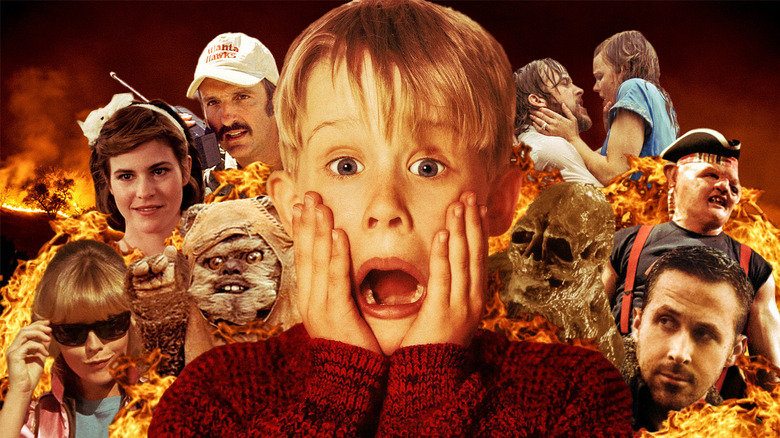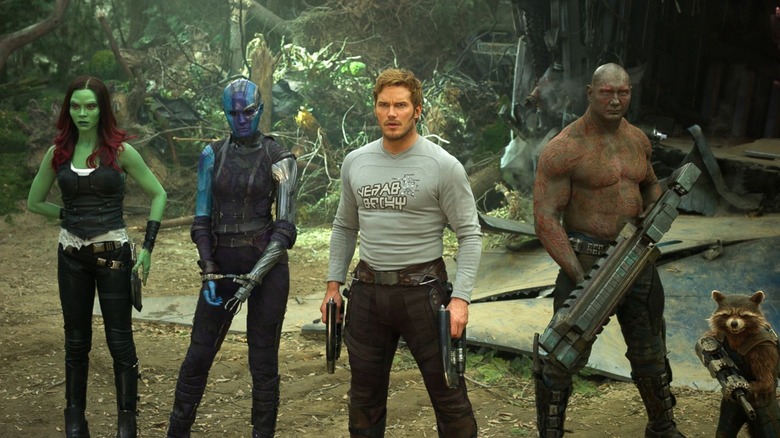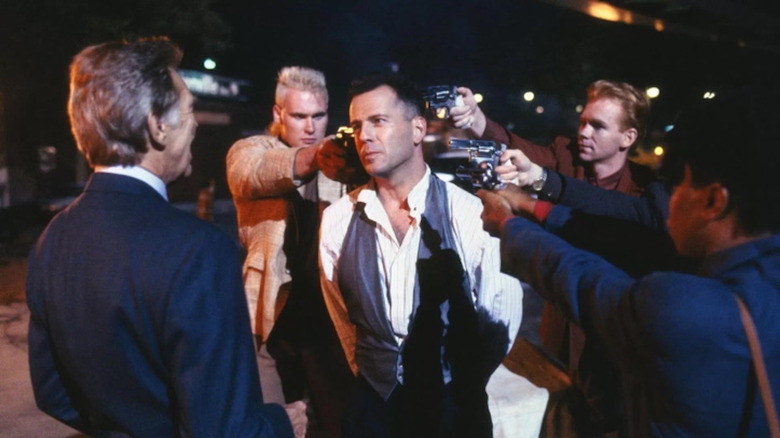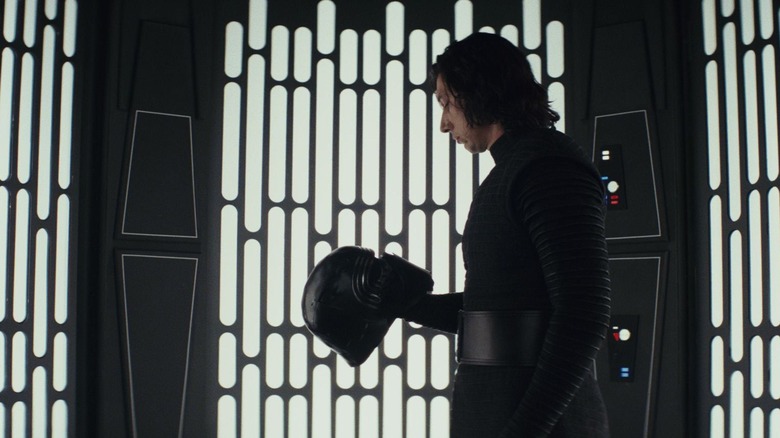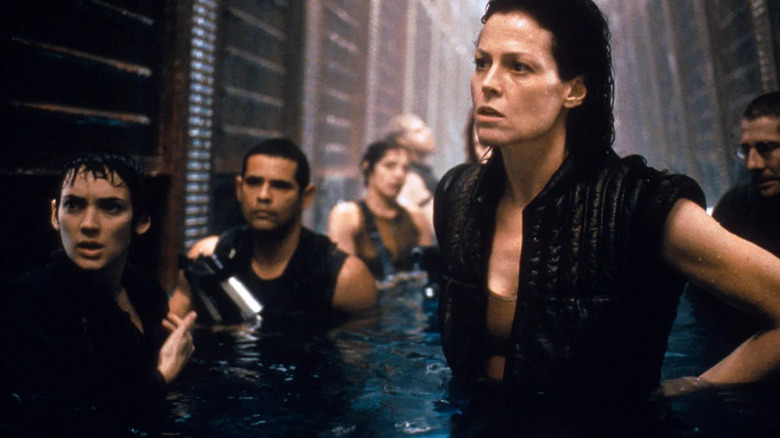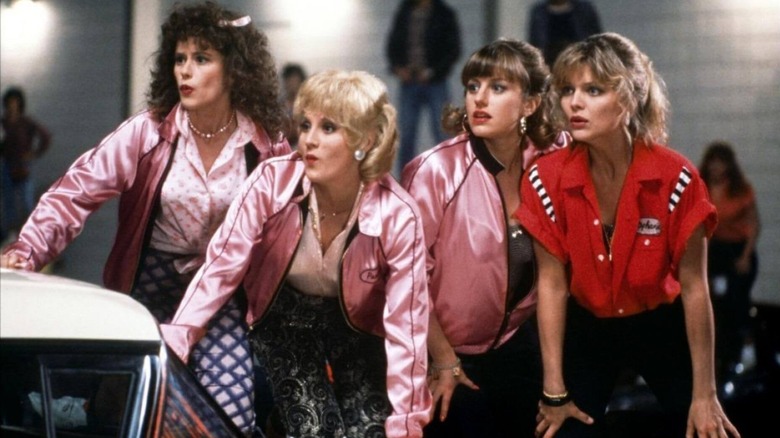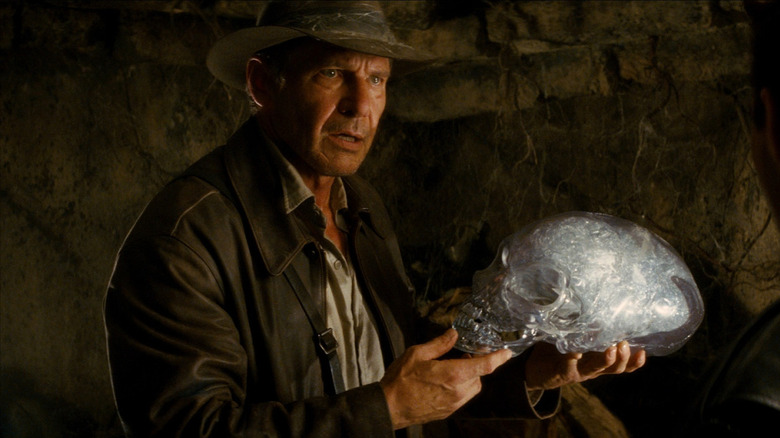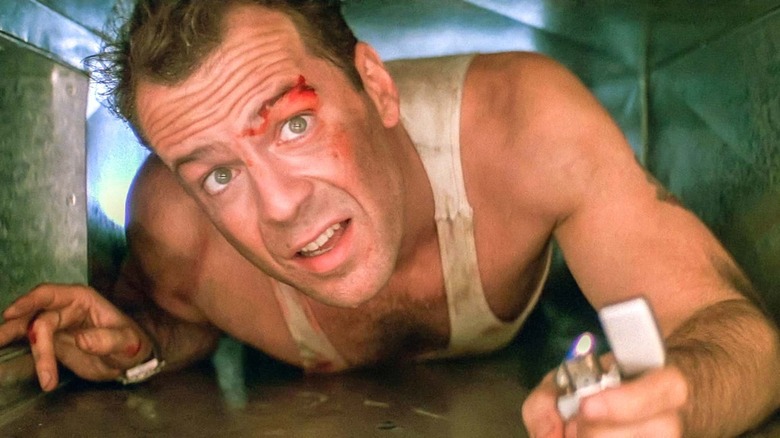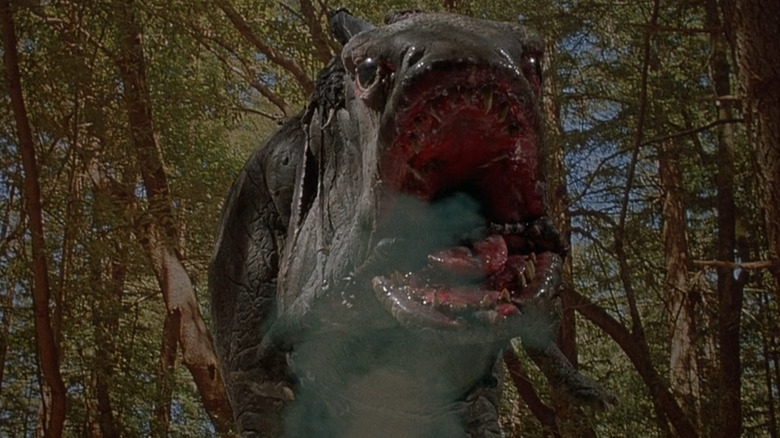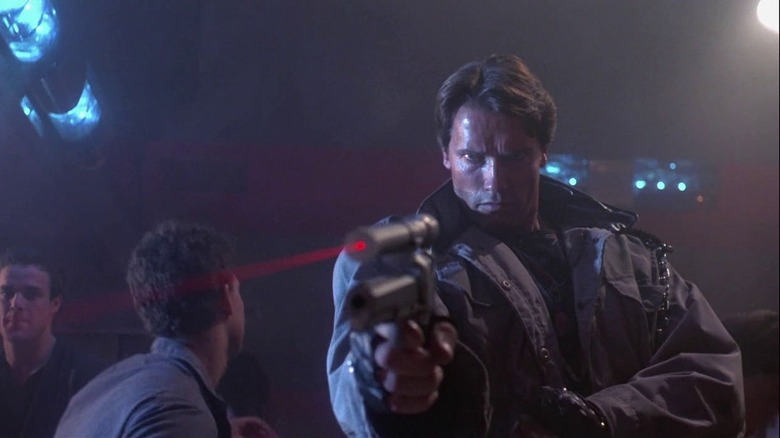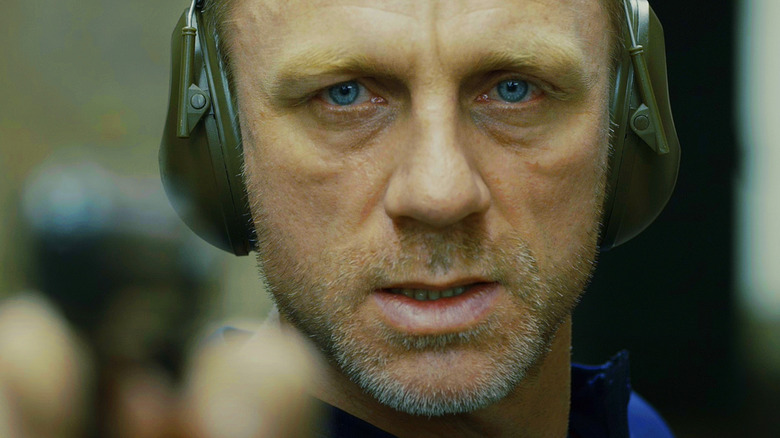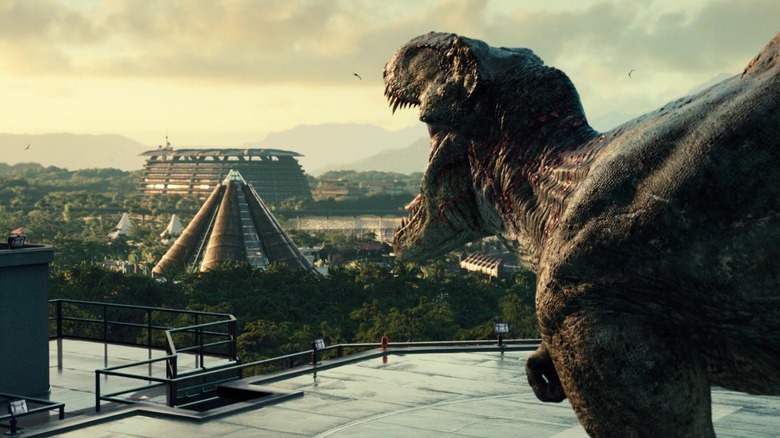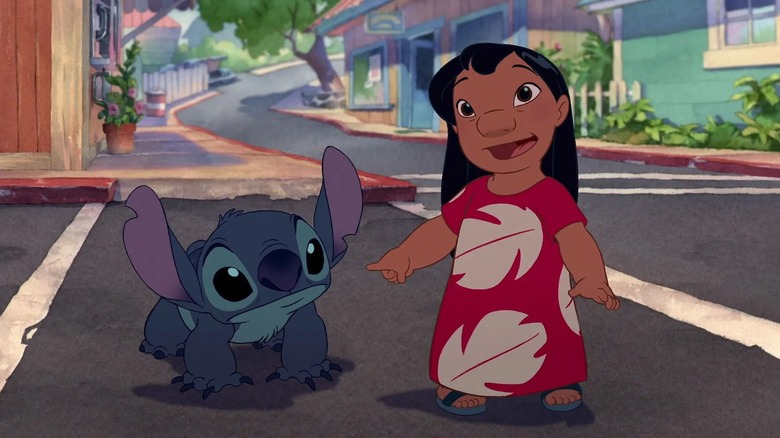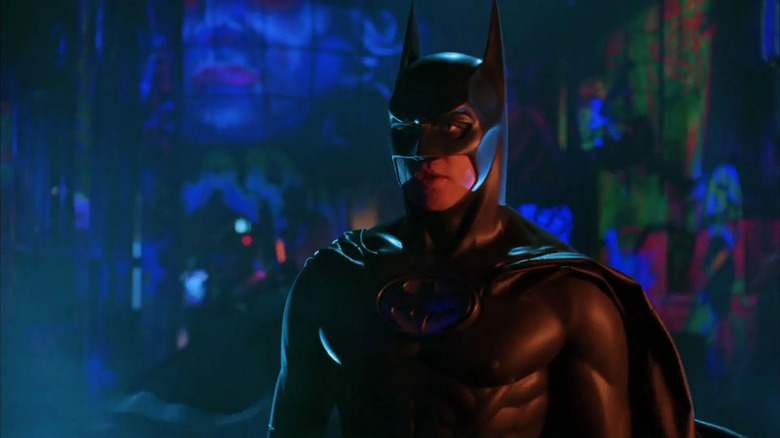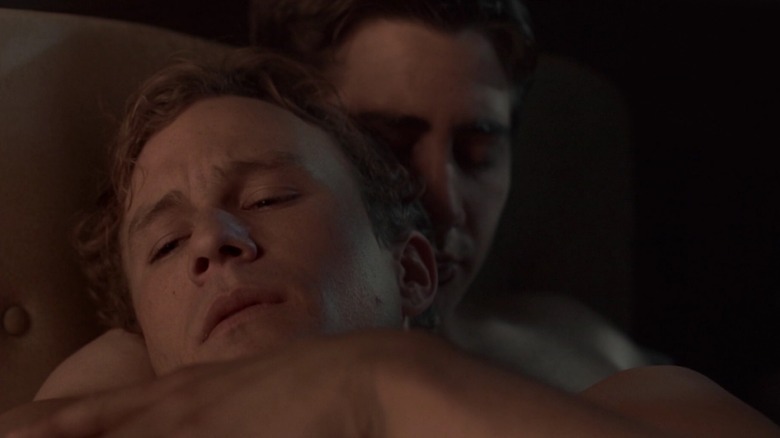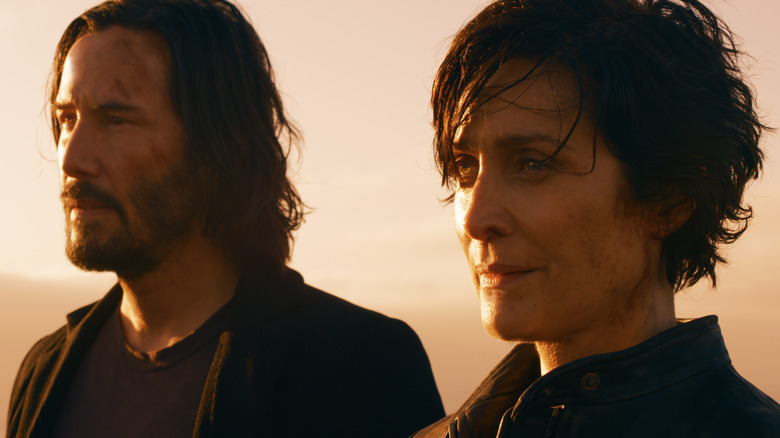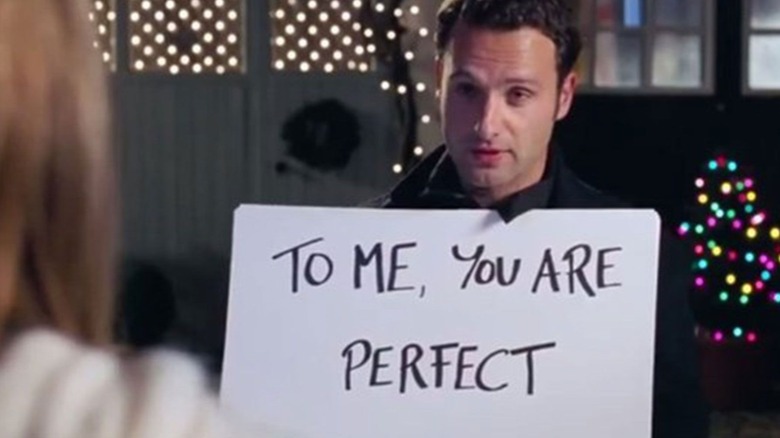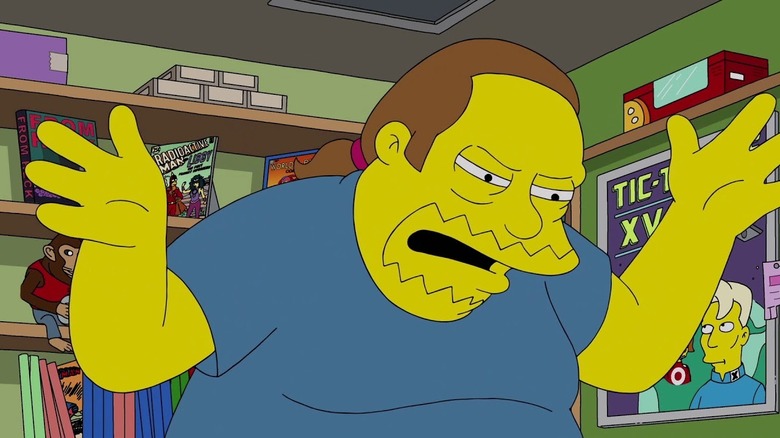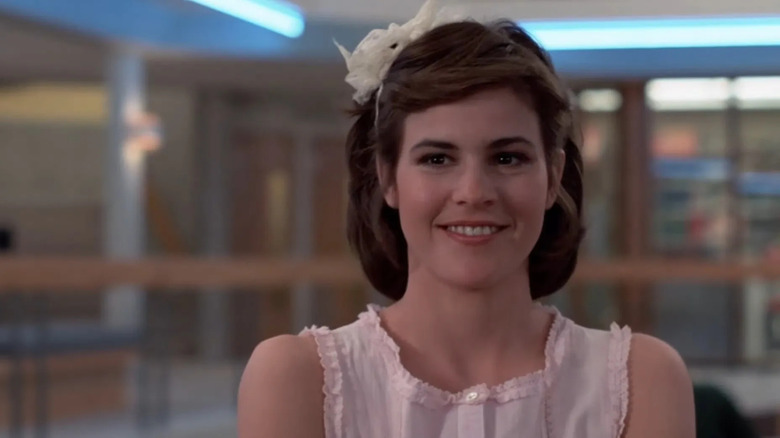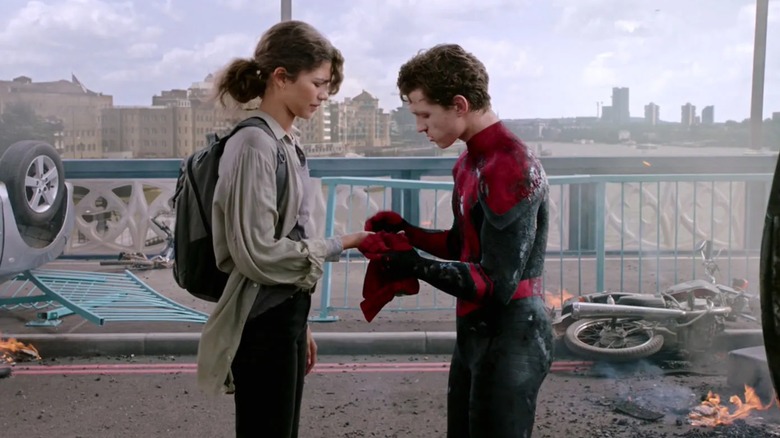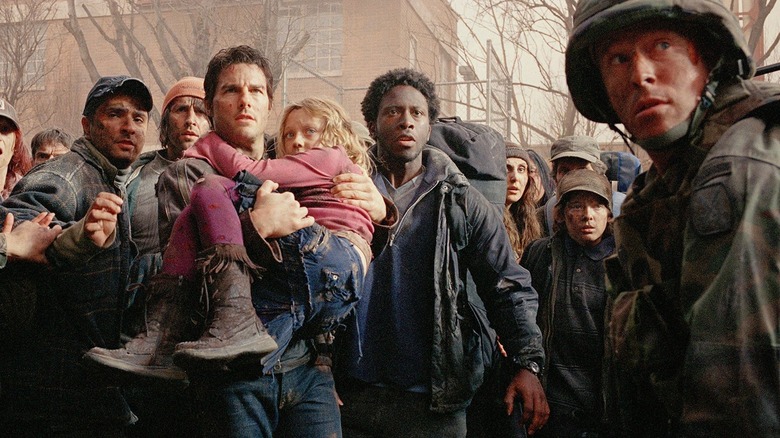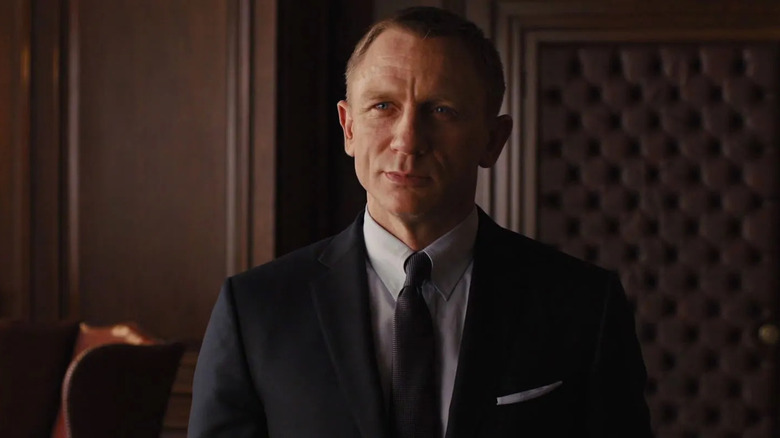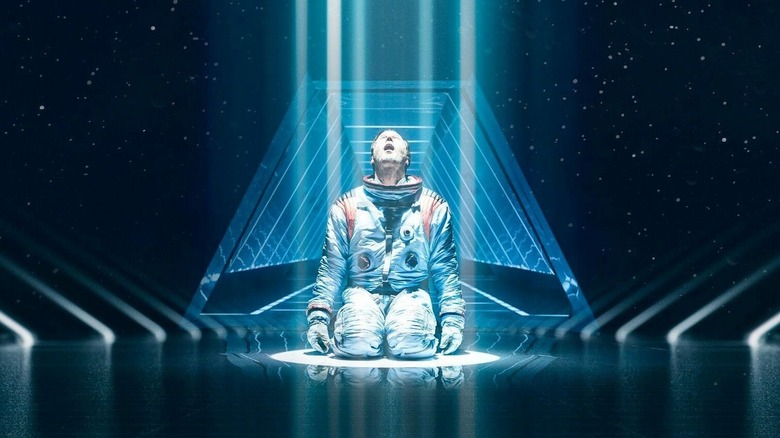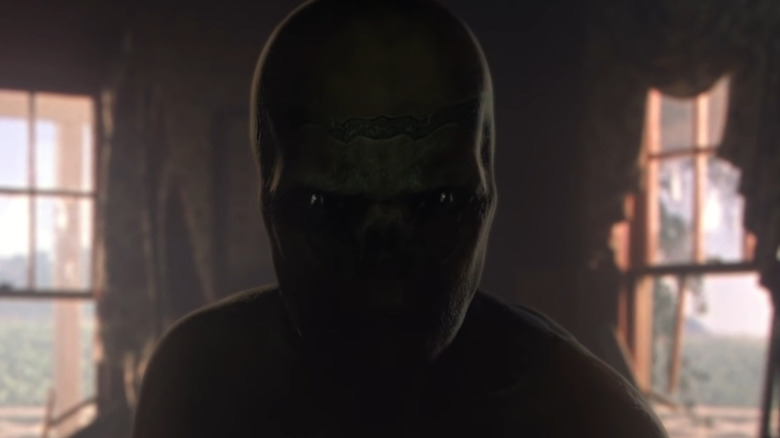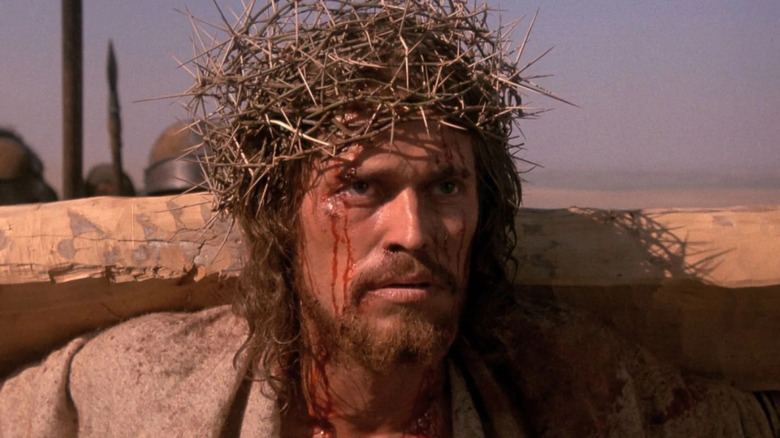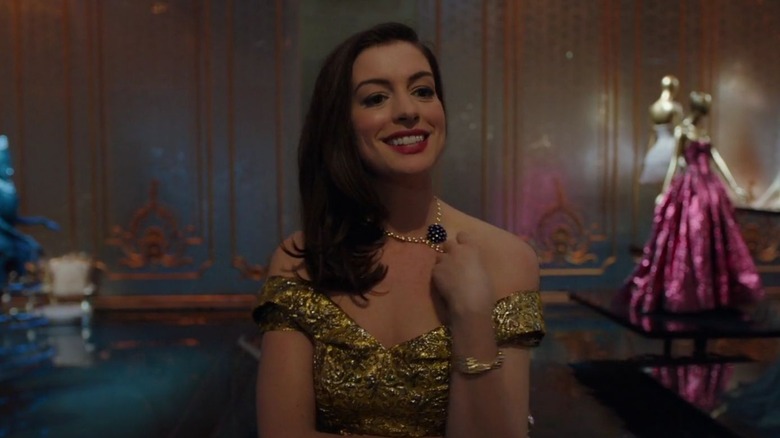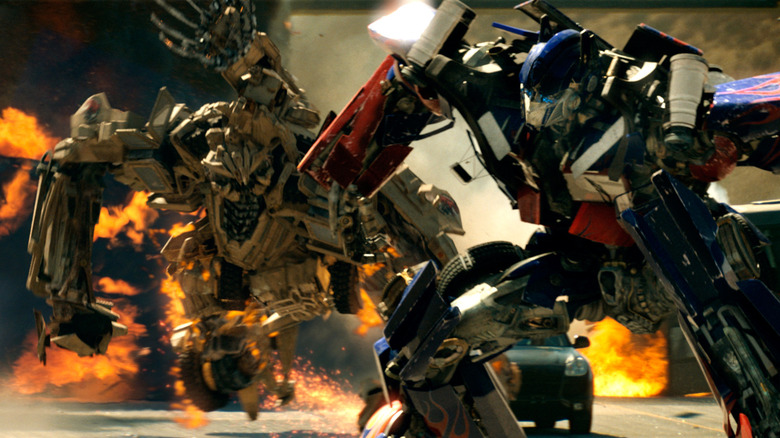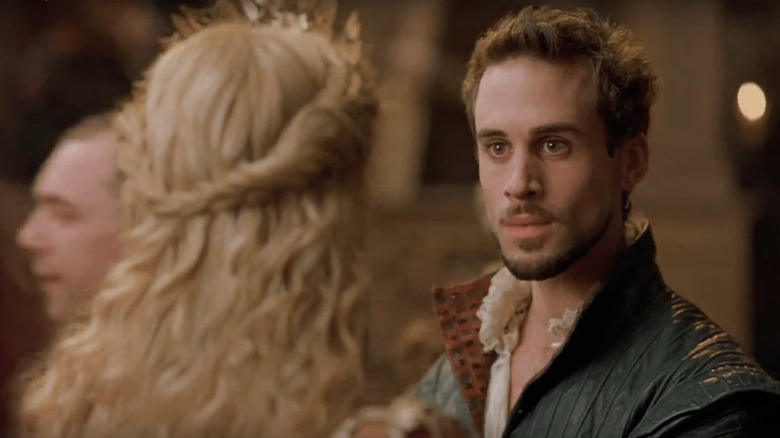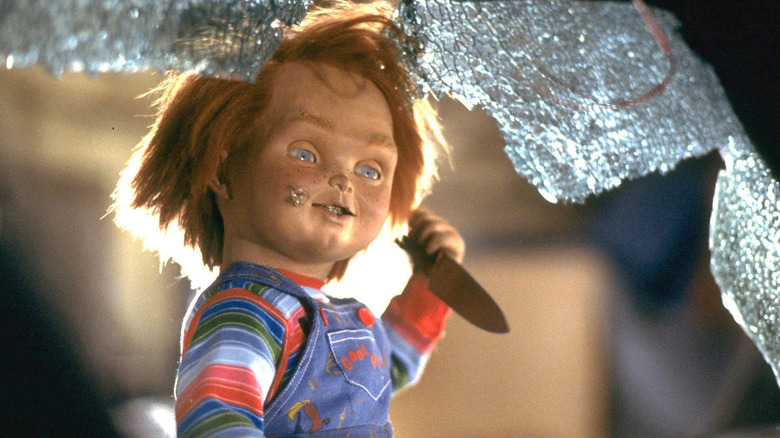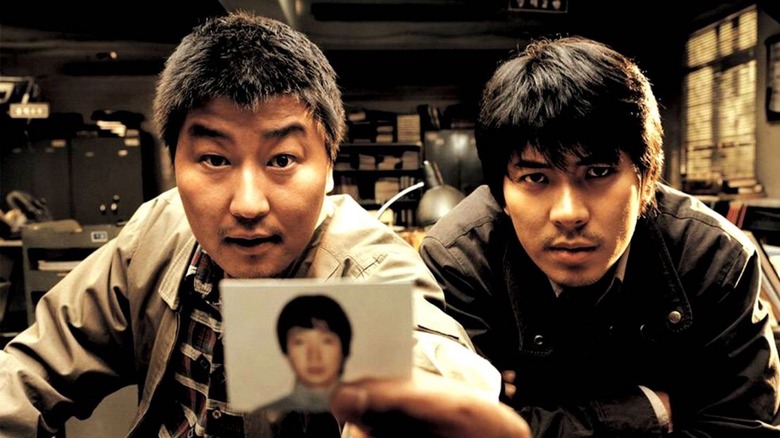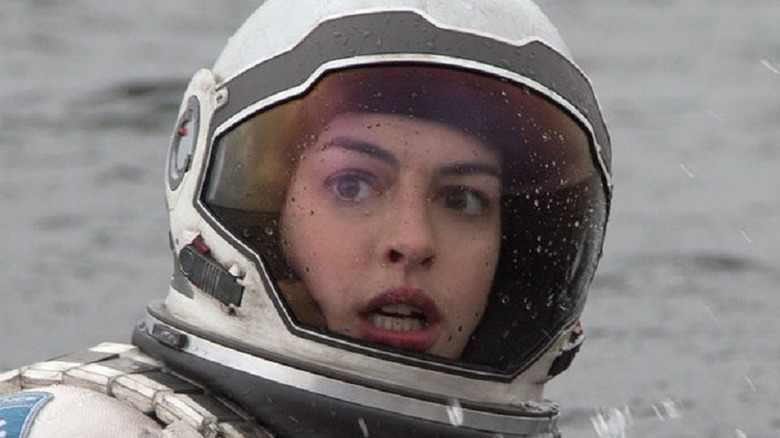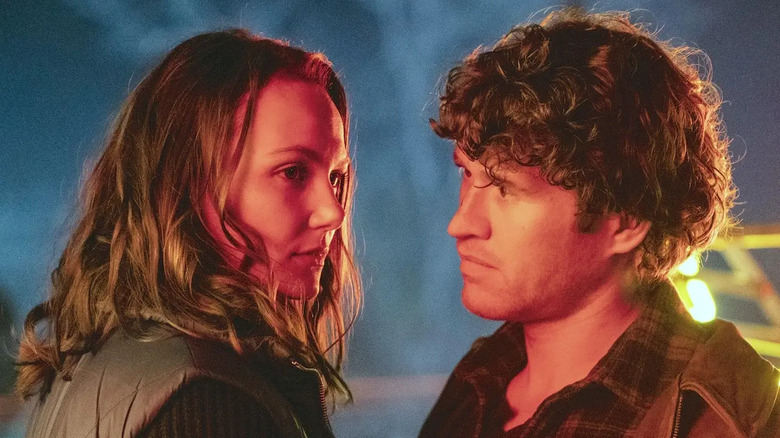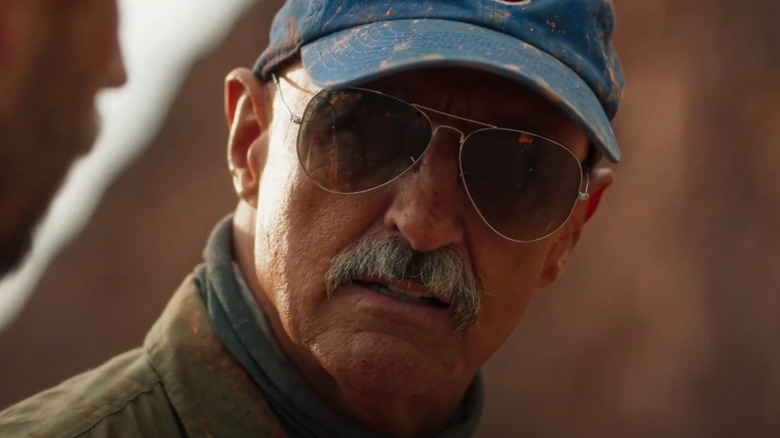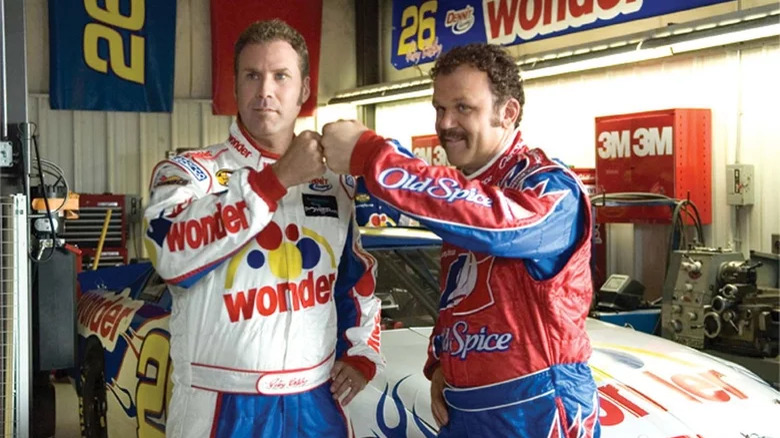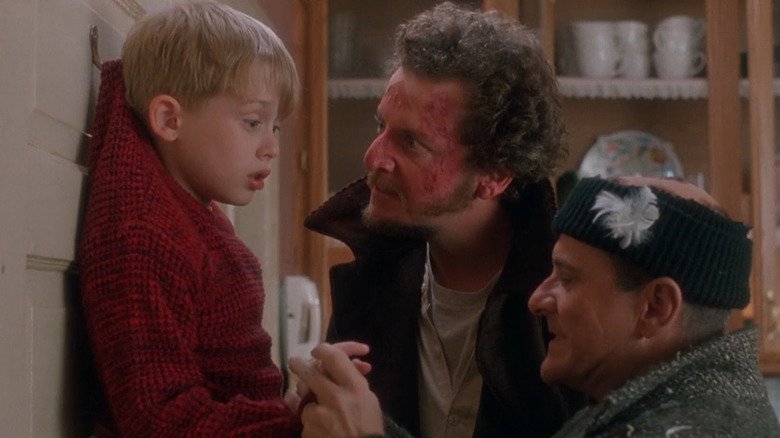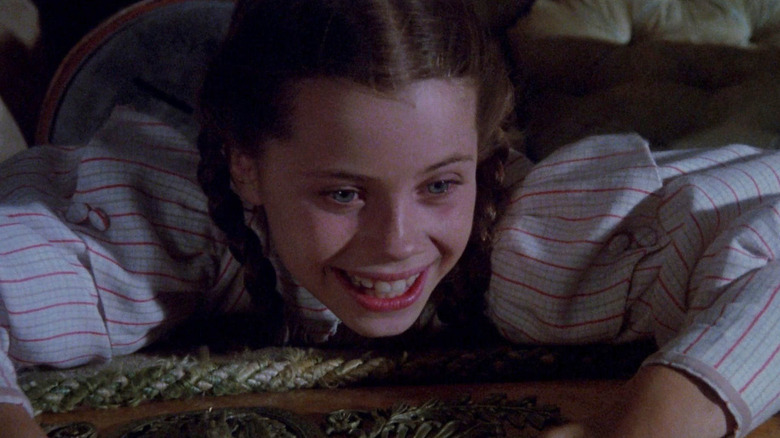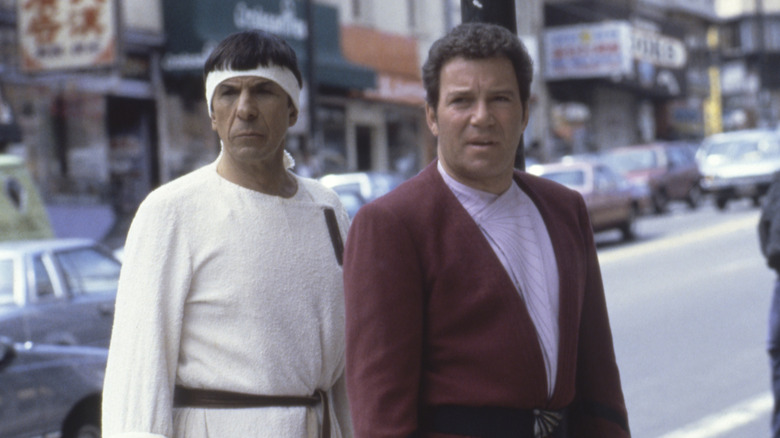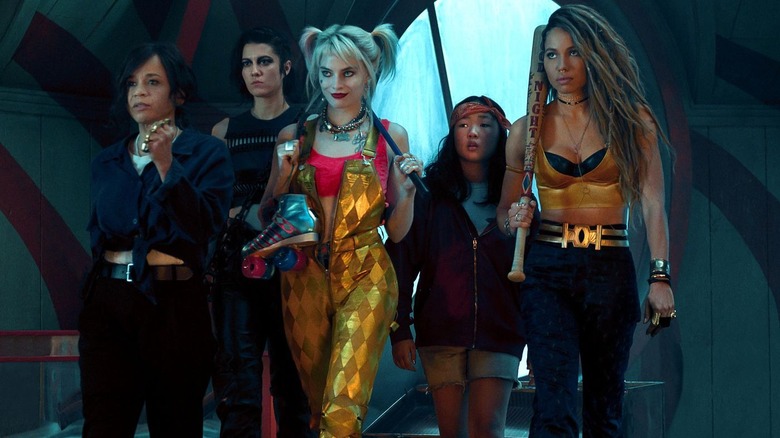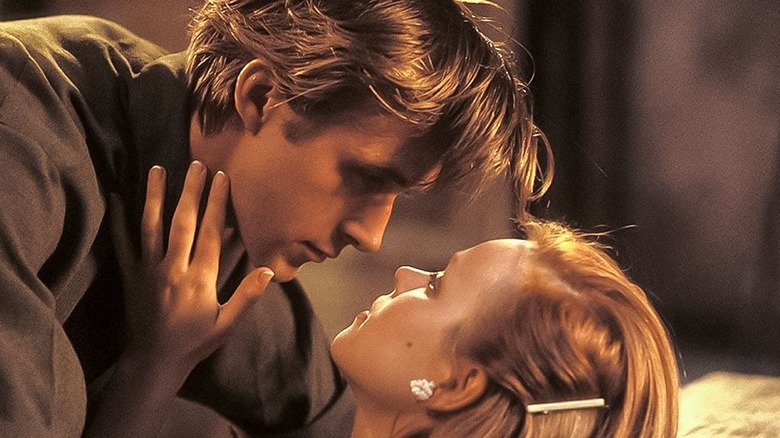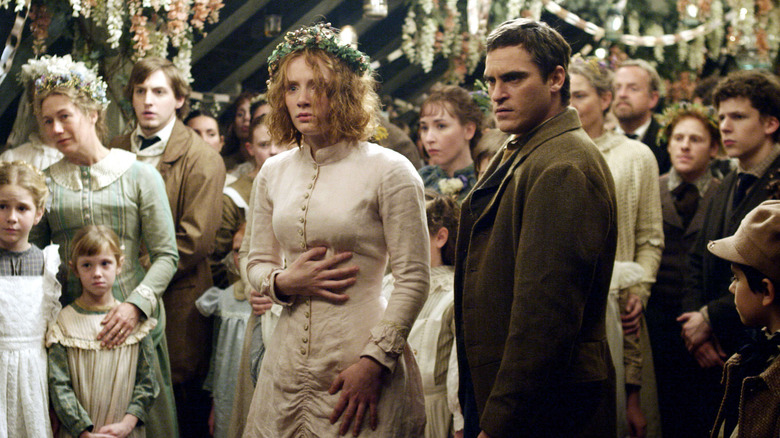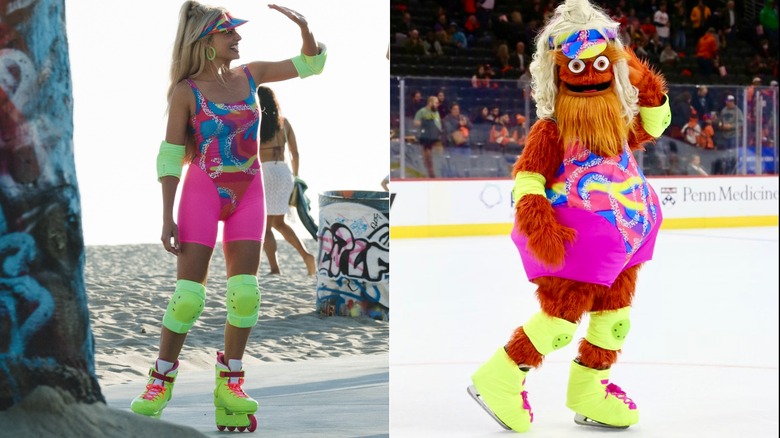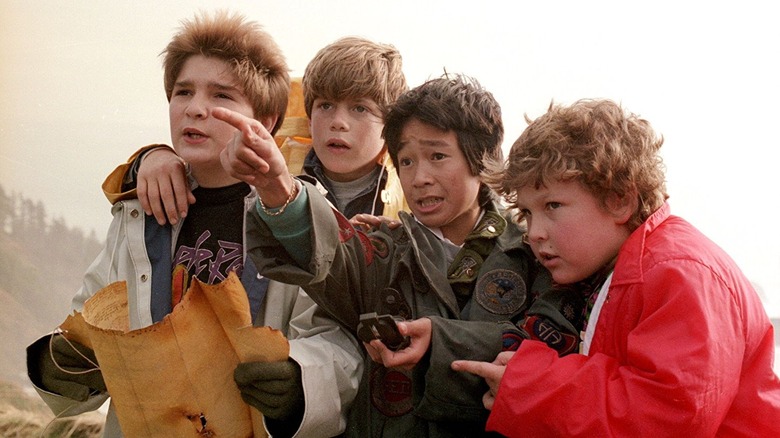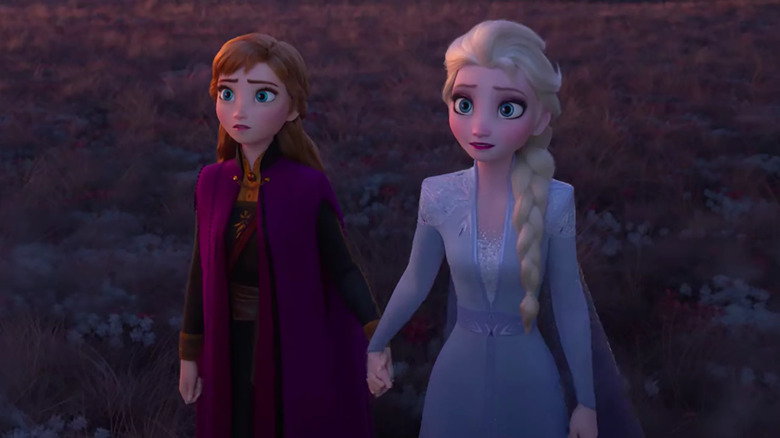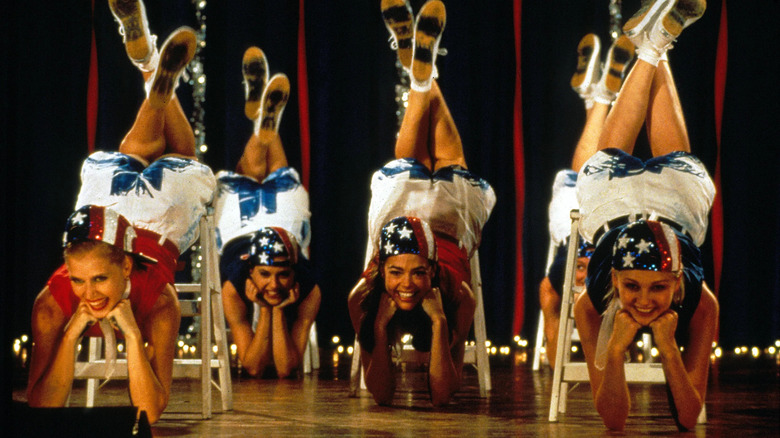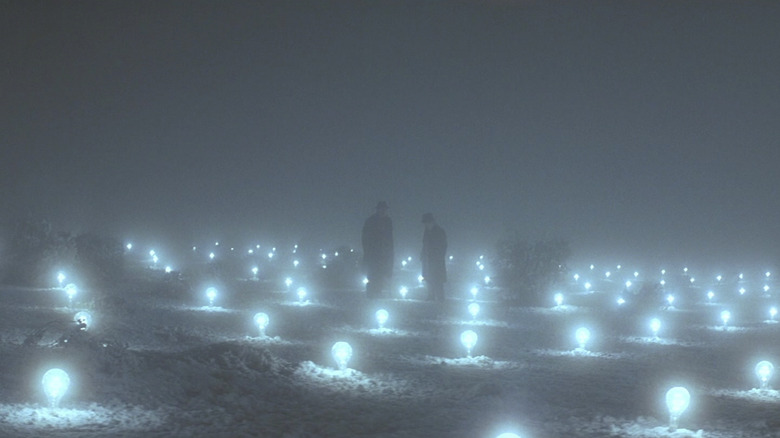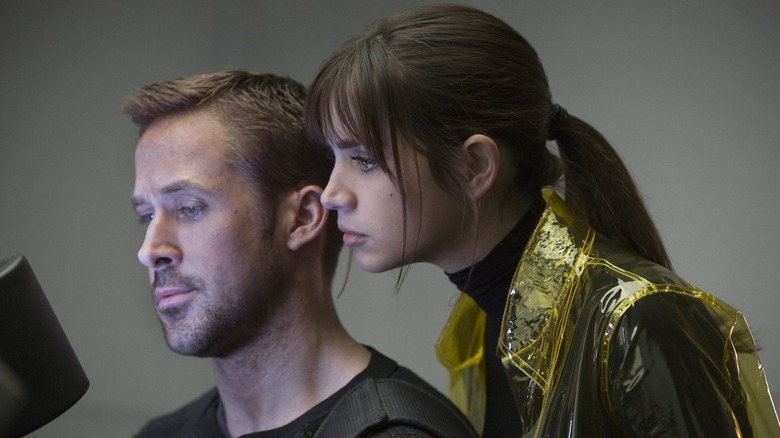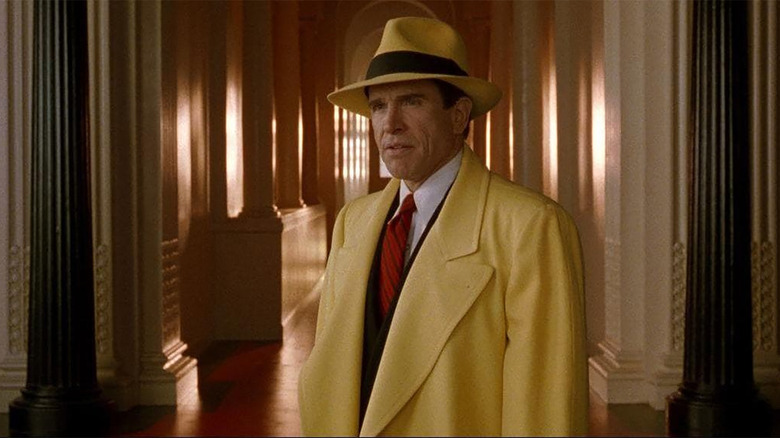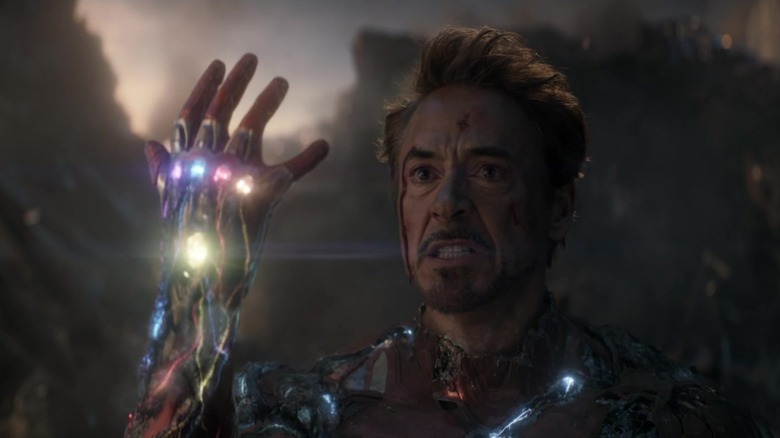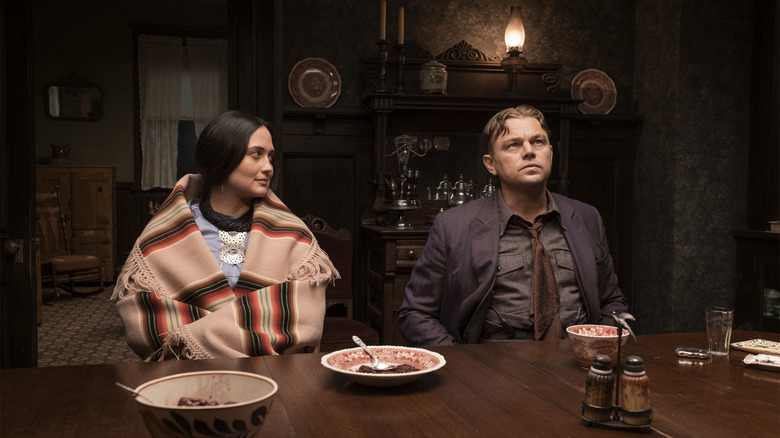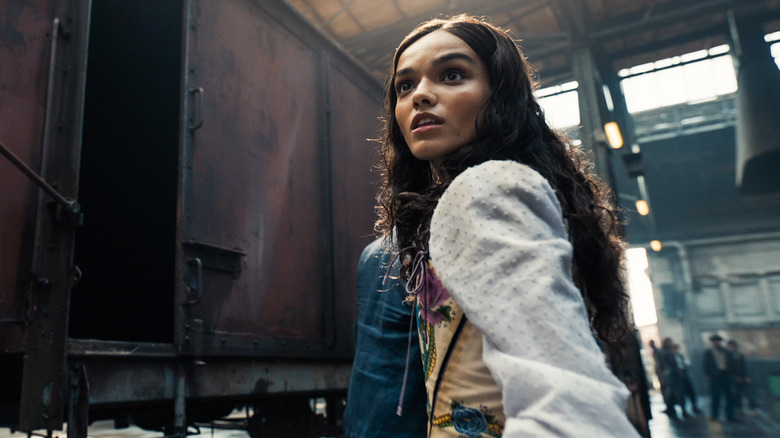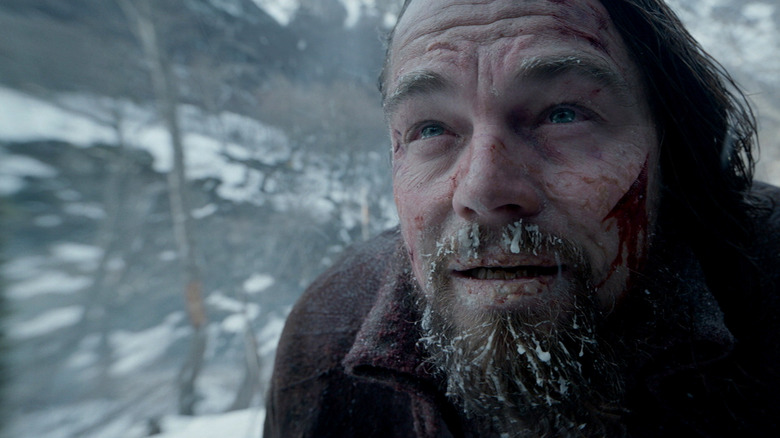/Film's 50 Hottest Movie Takes
Everyone has them. The movie opinions that earn them bewildered stares at parties. The movie opinions that end promising dates after the first round of cocktails. The movie opinions that get even beloved friends shouting at you. But you stand your ground. You dig in your heels. You believe this often unpopular take because you know, deep in your heart, that it's true. The rest of the world is wrong. You are the only sane one left.
Welcome to /Film's list of our Hottest Takes, a collection of opinions that will likely baffle, frustrate, and infuriate many of you. And you'll probably quietly nod along with a few of them. We asked the entire /Film team to pitch the takes that they know get them annoyed glances at best and furious monologues at worst. But this isn't a list built to anger anyone, and there is no entry on this list that the writer doesn't believe in from the bottom of their heart. This is a list about how we all have these sometimes specific opinions, and how even when we feel alone with our ridiculous movie hot take, we're not alone in having them.
But yeah, some of these takes will break your brain. Grab a helmet.
Guardians of the Galaxy Vol. 2 is the Best MCU Movie and It's Not Even Close
The average Marvel Cinematic Universe film is a good time at the movies. The best of them, however, transcend the studio's house style and deliver a personal vision. Taika Waititi's spectacularly funny anti-colonialism comedy "Thor: Ragnarok," Ryan Cooger's politically-charged afro-futuristic "Black Panther," and Scott Derrickson's exploration of faith and free will in "Doctor Strange" come to mind. But the best MCU movie is also the one that feels the most painful, the most achingly personal, and the most ripped from its filmmaker's wounded heart.
That's James Gunn's "Guardians of the Galaxy Vol. 2."
On the surface, it's a funny and exciting space opera where goofy characters save the universe, again. But linger on any given plot point, and the film becomes a tragedy about broken relationships, bad fathers, and the families we make. Peter Quill's dynamic with his father, the powerful cosmic being Ego, is unnervingly specific. An absentee dad returns to his son's life, charismatic and fun and handsome and promising the world, only to reveal himself to be an abuser and a scoundrel. The disappointment is palpable for the characters, whose thick skins should protect them from this kind of thing by now, but instead it only serves to keep their pain trapped within.
Gunn knows that family penetrates all armor, for better and worse. No one can wound Gamora and Nebula, embattled sisters, quite like one another. Rocket, the tormented and cynical experiment, finally allows himself permission to grieve when he knows he's loved. And Peter understands that Yondu was always the real dad in his life, and he never paused to consider that until it was too late. It's thematically coherent, a real gut punch, and feels like a filmmaker using the Marvel platform to bare his soul. (Jacob Hall)
Bruce Willis' Infamous Critical and Box Office Flop Hudson Hawk is a Masterpiece
In 1991, Bruce Willis was considered one of Hollywood's most bankable stars when he used his clout to make a zany caper movie in the absurdist style of Ted Flicker's "The President's Analyst." That he did so on a gargantuan budget, which ballooned during principal photography as the filmmakers scrambled to accommodate Willis' outré whims, angered many in the industry. As reports of on-set chaos surfaced in the media, the film was considered a preordained flop. "Hudson Hawk" never stood a chance.
And yet it's an ineffably brilliant lark of a movie. Starring Willis and Danny Aiello as a pair of cat burglars who time their robberies to pop standards (which they belt with endearingly tone-challenged gusto), it darts from New York City to The Vatican to Leonardo da Vinci's one-time castle workshop, where the hedonistic villains (played by the brilliantly unhinged Richard E. Grant and Sandra Bernhard) hope to destroy the world's economy by manufacturing gold. CIA agents, code-named after candy bars (and led by "The President's Analyst" star James Coburn) are also, inexplicably, involved. The then hot "Heathers" team of director Michael Lehman and screenwriter Daniel Waters (who shares credit with "Die Hard" scribe Stephen E. de Souza) roll with the madness and deliver a knowingly daffy action-comedy extravaganza that embraces and occasionally parodies its own on-the-fly construction. Was its production an ordeal? That only matters to the filmmakers. What matters to me is its ceaseless, go-for-broke, would-be blockbuster inventiveness that, 32 years later, has never been matched (sorry, "The Last Action Hero"). (Jeremy Smith)
Star Wars: The Last Jedi is the Best Star Wars Movie, Deal With It
Ever since the original trilogy, every "Star Wars" movie ever made has been engaged in a direct conversation with itself. The prequels depend entirely on our knowledge that Anakin Skywalker grows up to be Darth Vader and practically invite comparisons to the movies that came before. The sequels encourage a whole new generation of fans to imagine living in the shadows of the original legends. The various spin-offs feel like experiments, testing the bounds of how far or how closely they ought to hew to the standard formula. Never, however, has any of them felt as meaningful, challenging, or just simply as well-made as "The Last Jedi" is.
Much of it has to do with the film's strong, uncompromising point of view. Picking up where "The Force Awakens" left off, writer/director Rian Johnson pulls from Arthurian legend, George Lucas' own notes, and the basic tenets of good storytelling to reveal why a guilt-ridden Luke Skywalker has exiled himself from the galaxy. And as the villainous nephew he unleashed wreaks havoc on the galaxy, one disillusioned young Jedi-in-training simply wishes to know where she fits in among such mythological archetypes. The thematic conclusion "The Last Jedi" reaches is that everyone, regardless of their lineage or Force sensitivity or even the magnitude of mistakes they've made in the past, has the capacity to rewrite their own stories for good. No movie better understands the appeal of "Star Wars." (Jeremy Mathai)
There Has Never Been a Bad Alien Movie (Yes, Even Resurrection is Good)
Before we go any further, let me just say that I'm not counting the dreadful "Alien vs. Predator" movies as part of the main "Alien" franchise. Now that that's out of the way, allow me to be bold and proclaim that all of the "Alien" movies are good. Of course, everyone knows that the original "Alien" and its sequel "Aliens" are great. But I firmly believe that every movie in the series — including "Alien: Resurrection" and Ridley Scott's two prequel films — is worthwhile.
Are they as good as the first two films? No, of course not! But they are solid sci-fi entries. David Fincher's butchered "Alien 3" is dark, bleak, and unpleasant, but that doesn't make it a bad movie. Indeed, it's a testament to Fincher's skill that the film works at all seeing as it went through a ton of behind-the-scenes issues. Then we have "Alien: Resurrection," which is one of the weirdest studio blockbusters you'll ever see, complete with a scene where Sigourney Weaver, playing a resurrected clone of the dead Ripley, sensually writhes around with some xenomorphs. She also plays some basketball and kind of flirts with a robot played by Winona Ryder! It's a weird, weird movie, and it's never, ever boring. That goes a long way, folks.
Then we have Ridley Scott's weird, dark, gothic prequels. I know people don't care for these films, and yet, I think they're bold, inventive, and strange. Give me interesting oddities like these movies any day over the same old boring junk. (Chris Evangelista)
Grease 2 is the Word, Not the Original Grease
I make no apologies for my love of "Grease 2" and anyone familiar with my work already knows that I have been the parade marshal of the "Grease 2" > "Grease" celebration for years. I could sit here and talk about how "Grease" is the world Trump is talking about when he wants to "make America great again" or that the film is filled with insufferable characters that refuse to own up to how awful they are or that the music is only beloved because it appeals to both children and grandparents (and was based on an already popular Broadway show) or parrot the chorus of thousands who hate Sandy's ending ... but I'd much rather talk about why "Grease 2" rules.
"Grease 2" delivers a feminist icon in Michelle Pfeiffer's Stephanie Zinone, has well-crafted songs that have infinitely more to say than "rama lama lama ka dinga da dinga dong," was directed by choreographer Patricia Birch so the dancing is INCREDIBLE, and has a love story that actually makes sense and doesn't come at the expense of a man refusing to acknowledge he has feelings because he's afraid his boys will judge him. "Greased Lightning" is a horny song about a car, but "Prowlin'" is a horny song about being horny for actual human women. People don't like "Grease 2" because it's a film that's honest about being a messy, melodramatic, oftentimes cringeworthy teenage experience and not the fantasy dream of the original. Sorry about it, but I want a whole lot more than the boy next door ... I want hell on wheels. (BJ Colangelo)
Indiana Jones and the Kingdom of the Crystal Skull is Quite Good and You're Just Cowards Who Are Afraid to Admit It
Indiana Jones is one of the most iconic characters in cinema history, but as popular as the original movie is, the fourth film in the franchise is just as loathed. "Indiana Jones and the Kingdom of the Crystal Skull" was reviled upon release for the way it departed from the original trilogy's tone and genre. The thing is, everything bad and good about the trilogy is also found in this film. The silliness, the over-the-top villains, and the unbelievable physics-breaking moments some fans love to make fun of — yes, Indy used a fridge to survive a nuclear blast, deal with it — aren't that much sillier than any of the big cinematic moments in the first three movies. Sure, the CGI is dodgy at times, but there are still some incredible practical sets and effects in the film.
Seeing an older Indy forced to work with a sidekick with such a generational gap as him and Mutt leads to some genuinely funny moments without resorting to mocking the idea of an older Indy. But what makes the movie shine is its embracing of pulpy sci-fi B-movies from the '50s, which made the film feel fresh. The tone might be different, yes, but it is a fascinating reflection of its two creators grappling with questions about patriotism and violence in a post-9/11 world that adds gravitas to the film. It is silly, it is fun, it is pure "Indiana Jones." (Rafael Motamayor)
Die Hard is Not a Christmas Movie and Calling It That is Stupid and Tired
Enough. Enough. We've seen your little tweets and memes and articles. It no longer matters how well-founded the claim that "Die Hard" is a Christmas movie may be. It started as a joke and will remain one until people stop repeating it. And I don't mean the kind of joke you laugh at.
To be honest, I don't even have an opinion on whether the classic 1988 actioner starring Bruce Willis and Alan Rickman is sufficiently Christmas-y to qualify as "a Christmas movie" or not. Were you to create some sort of metric where you averaged scenes featuring holiday music, decorations, colors, and Christmas-motivated line readings/actions together against their secular counterparts, you might come out with a judgment in favor of "Die Hard" as a bonafide Christmas classic. This has nothing to do with why the madness must stop.
"Die Hard" is a great movie. It's long but lean; the Oscar-nominated editing by Frank J. Urioste and John F. Link is svelte and athletic; Bruce Willis was in top form, fusing in the way only he knew how a boyish insouciance and rugged, almost Terminator-esque indestructibility; the story, there's no other way to say this, goes extremely hard, with its terrifying nazi villains and claustrophobic vent crawling. It's both wonderfully escapist and meaty enough to sink your mental teeth into. So please, for the love of John McClane, can we all stop reducing it to the punchline of a twee internet meme? It's set at Christmastime. It isn't a Christmas movie. Justice for "Die Hard"! (Ryan Coleman)
Ewoks: The Battle for Endor is Better than Most Theatrically Released Star Wars Movies
Some people are protective and even judgmental about what is and isn't "Star Wars," and claim that certain installments in the series "don't count." You've probably noticed that the two live-action "Ewoks" movies — "Caravan of Courage" and its sequel, "The Battle for Endor" — rarely wind up on lists that claim to rank all the "Star Wars" films, either because they weren't theatrically released (which they were, just not in the U.S.), or they're not canon (which they were, until Disney came along), or because they stink (which is only half right, but also immaterial).
"Caravan of Courage" is admittedly poorly crafted, with impressive visual effects but a thin story and annoying characters. But "Battle for Endor" is really quite good, thanks in large part to the fact that it opens with almost every character from "Caravan" getting brutally murdered in the first scene. What follows is a surprisingly dark film with memorable villains, high stakes, and new and interesting wrinkles into the way "unnatural abilities," as Emperor Palpatine would have called them, worked in the "Star Wars" universe.
"Battle for Endor" is pulpy, entertaining sci-fi that "Star Wars" can be proud of. Compared to the canonically important but poorly executed prequel trilogy, the underwhelming animated film, the profoundly disappointing "Rise of Skywalker," and even the clunky mixed-bag "Solo," it works on its own merits, as a movie, even more than most of the more "official" chapters. (William Bibbiani)
James Cameron Never Made a Better Movie Than The Terminator
Before he made a career out of directing the biggest movies of all time, James Cameron learned the ropes by working for Roger Corman. The legendary B-movie filmmaker and producer was a master at maximizing budgets — give him a dime and he'd make it look like a buck. On a Corman set, nothing was wasted and creative filmmakers could utilize style in place of cash.
If Corman's world was Cameron's film school, consider 1984's "The Terminator" his senior thesis. The film is the rare one to actually earn the "iconic" descriptor, and Arnold Schwarzenegger's performance as the titular killer cyborg is one of the cinema's all-time-great collisions of actor and character. It's a masterpiece. And while many see it simply as the platform that allowed him to make bigger and slicker movies like "Aliens," "Terminator 2: Judgment Day," "Titanic," and "Avatar," I can't help but think it's still Cameron's best movie.
Look, that's not a putdown on those other films. Every Cameron movie ranges from "extremely good" to "incredible," but they're all massive and slick, projects engineered to thrill the most mainstream audience possible. "The Terminator" is not that. It's a grim, nasty, truly upsetting slasher movie wearing sci-fi garb. It's a low-budget journey into an unpleasant nightmare, a grim B-movie that uses a massive imagination to lend scale to what's ultimately a harrowing chase film. "The Terminator" is Cameron at his most Corman. It's him at his smallest. It's him at his most creative. It's him forced to turn a dime into a buck in each and every scene.
What would Cameron's career look like if he had made more movies where he didn't have every thing tool available at any given moment? I'm not sure. But "The Terminator" fascinates and unsettles in a way his other films do not. (Jacob Hall)
Skyfall is the Worst James Bond Movie
When 2006's "Casino Royale" arrived, we got arguably the finest James Bond movie ever made. The most compelling element was how the film took Bond tropes of old and "wore them with such disdain," as Eva Green's Vesper Lynd says during her train rendezvous with 007. The film simultaneously appreciated what made Bond Bond while subverting many of his trademarks, making for a truly electrifying entry in the canon. The follow-up, "Quantum of Solace," was a disaster, but only because it set the stage for "Skyfall" — the real moment Daniel Craig's Bond movies started going downhill.
With "Skyfall," suddenly the tropes that were jettisoned to such exhilarating effect in "Royale" were all back. Q, his gadgets, the ejector-seat equipped Aston Martin, Moneypenny. They even had the nerve to kill off Judi Dench's M — perhaps the strongest and most consequential female character in Bond history. But the real kicker was how the movie tried to pretend it was still just as refreshingly gritty as its predecessors, when in reality it was a parody of the tortured Bond that had felt so realistically layered in "Royale."
You can also chart a direct line from "Skyfall" to the ridiculously overblown ending of "No Time to Die," yet another reason "Skyfall" remains the most crushingly disappointing entry in the Bond canon. "Die Another Day" is at least a fun watch. But I'm genuinely astounded "Skyfall" gets as much love as it does. (Joe Roberts)
Jurassic World is a Terrific Sequel and Just What the Franchise Needed
In 2015, "Jurassic World" revived a franchise that had been dead (don't you mean extinct?) for 14 years and did so in a way that compelled the moviegoing masses to share a collective experience. Directed by Colin Trevorrow, there are few movies that have ever been more commercially successful. Period. And yet, it feels like a movie that the majority of people who write about movies not only dislike, but loathe.
Critical opinion does not follow the audience. So many of my peers roll their eyes at the great popcorn fun that is "Jurassic World." As a man who counts "Jurassic Park" as his favorite movie of all time, to say that my anticipation for this film was high in the summer of 2015 would be a dramatic understatement. It delivered the goods for me and then some. It was a rollercoaster ride I wanted to go on again and again. And given that the movie's tagline was "The park is open," that feels like a mission accomplished. From getting to see John Hammond's vision of a dinosaur Disneyland finally brought to life, to watching a T-rex and a raptor work together to take down the Indominous Rex, this is what legacy blockbusters should be. Familiar yet fresh, fun, and not overly serious.
The criticism, to me, has always felt like needless cynicism. I'll be the first in line to share my misgivings about "Fallen Kingdom" or "Dominion," but when we talk about movies that are unfairly s*** on, this is right at the top of the list. Honestly, who hates fun enough to pick a fight with this movie? At worst, it's harmless fun. But it is, in my humble opinion, everything I love about going to the movies. (Ryan Scott)
Lilo & Stitch is Better Than All The Original Disney Classics
Choosing the best Disney animated film is a near-impossible task. Many are groundbreaking but imperfect ("Snow White"), endearing yet poorly-aged ("Peter Pan"), or simply too tied into viewers' own personal sense of nostalgia for us to evaluate them clearly (your mileage will obviously vary here). Few Disney animated movies are actually perfect, but "Lilo & Stitch" is.
Nearly every modern Disney film that aims for zoomed-in cultural specificity and emotionally-driven storytelling wants the sense of balance and authenticity that "Lilo & Stitch" has, and nearly every movie before it is lesser for its lack of these elements. Crucially, the movie marks what might have been the last time Disney or its subsidiary Pixar made us all cry without feeling like it was actively angling for our tears as part of its brand. The film's foster care plotline, pet adoption premise, and explanation of "ohana" all feel organic and unique.
Tear-jerking moments aside, "Lilo & Stitch" amps up both the fun and cute factor Disney is known for. The film's Hawiaan setting and unorthodox family situation radiate a sort of warm chaos unlike any other Disney film — and few other toy aisle-friendly characters have the same level of adorable staying power of hyperactive alien Stitch. Add in a phenomenal voice cast, unforgettable soundtrack, and plenty of sweet and silly moments brought to life by vivid animation, and in terms of entertainment if not innovation, "Lilo & Stitch" is truly the crown jewel of Disney Animation. (Valerie Ettenhofer)
Batman Forever is the Best Batman Movie (Sorry, Christopher Nolan)
There are a lot of good "Batman" movies. There are a couple of terrible "Batman" movies. And then there's "Batman Forever," a movie that somehow encapsulates everything about the caped crusader — the good and the bad. I've written about why Val Kilmer is the best Batman at length, so there's no need to rehash any of that, but let's look at the beauty of "Batman Forever." Joel Schumacher's film embraces the camp qualities of the "Batman" television series with Adam West while also drawing from the stark visual style created by Tim Burton in his two films. "Batman Forever" is sexy, queer, gorgeous to look at, and more than a little silly, which are all things one can ascribe to the "Batman" franchise as a whole.
People love to hate on "Batman Forever" because of things like the nipples on the Batsuit and Kilmer giving a thumbs up while dressed as Batman, but is that really any worse than Christian Bale's turbo-deep "Batman voice" or all of the meme-worthy Bane moments in "The Dark Knight Rises"? Batman doesn't always have to be dreary and super serious, after all, and "Batman Forever" is one of only two Batman movies to show him with a sidekick (the fabulous Chris O'Donnell as Robin). It's a perfect Batman movie and a darn fun movie besides, with wild performances from Tommy Lee Jones and Jim Carrey, and it deserves more love. (Danielle Ryan)
Dear Youths: Movie Sex Scenes Are Awesome, and You Will Understand This One Day
A recent study from UCLA surveyed 1,500 Gen Z young adults. 47.5% of the respondents said sex scenes are uncomfortable to watch and unnecessary to the plot. "Whatever little traits either character had are lost as soon as they are engaged in plotless, pointless sex. They just feel so generic and icky, in the same way as pornography," one 23-year-old said.
Since cinema holds up a mirror to our lives, this puritanical ignorance of such a fundamental aspect is irresponsible and limits the breadth of a filmmaker's storytelling. A well-executed sex scene can serve as a catalyst for the plot or reveal an individual character's personality, motivations, and desires. It can also illustrate relationship dynamics, bringing characters closer together or even tearing them apart. Without seeing the intense and hidden passion between Jack and Ennis during their brief countryside respites, would movies like "Brokeback Mountain" have the same profound impact? Could "Don't Look Now" effectively convey the confusion and depth of the Baxters' grief without their passionate but sorrowful lovemaking?
Visuals of sexuality provide moviegoers with the awareness of everything that sex should or shouldn't be. Audiences need to see that sexual experiences are multifaceted, capable of being tender, wild, intense, messy, or even embarrassing and painful. By censoring sex, you develop unrealistic or romanticized expectations and build the act up as something overwhelming, mysterious, shameful, or fearsome, when really it is just a natural physiological part of life and our identity. (Caroline Madden)
The Matrix Sequels Aren't Just Great Movies – They're Essential
You probably know the familiar refrain: "The first 'Matrix' is an all-timer ... too bad about those sequels." After blowing our collective minds back in 1999, obviously the Wachowskis bit off more than they could chew during their next go-arounds and ended up tarnishing the once-unblemished reputation of the original. Oh, and the less we say about the fourth movie, the better. Right?
Wrong. I'm here to spread the Good News about the much-maligned "The Matrix" sequels. All of them. Not only do they weave an elegant tapestry that's far better than their reputation suggests, but they're actually essential additions to the story of Keanu Reeves' Neo and Carrie-Anne Moss' Trinity. In the case of "The Matrix Reloaded," the biggest criticism lobbied against it is precisely the reason it works so well. Having constructed the perfect hero's journey the first time around, "Reloaded" does what all the greatest sequels do and fundamentally shakes up everything we thought we knew. The Architect's reveal that the entirety of "The Matrix" was part of his grand plan is the kind of blockbuster shocker we don't get nearly often enough, and "The Matrix Revolutions" takes this new status quo and delivers the epic war movie we were waiting for. The (seemingly) final fates of both Trinity and Neo are actually quite beautiful and perfectly tee up the swerve to a heartfelt love story in "The Matrix Resurrections." Free your mind from preconceptions and let yourself enjoy one of the best sci-fi sagas ever made. (Jeremy Mathai)
Love, Actually is a Piece of S**t, Actually
It was November of 2003, and the world — especially America — was ready to fall in love again. Eschewing the doom and gloom brought on by the horrible terrorist attacks of September 11 and all that followed in their immediate wake, prolific writer Richard Curtis (having penned the scripts to the likes of the pleasant, clever rom-coms "Notting Hill" and "Bridget Jones' Diary") decided to take the director's chair for the first time and begin his sprawling romantic comedy epic "Love Actually" with Hugh Grant's Prime Minister deliberately — and awkwardly — evoking 9/11 as a way of announcing to the audience that this movie would act as a clarion call of positive vibes, something that would wash away the stench of sadness from the past few years.
I'm not going to be so glib as to say that "Love, Actually" is somehow worse than a national tragedy; I'm not a monster. Yet Curtis' film is just rancid (not to mention smirkingly glib) enough that the thought crossed my mind for the briefest of seconds. "Love, Actually" is a saccharine mess, its 136 minutes stuffed to the brim with thinly-drawn characters (the better to fill the film's nine storylines), moments that are head-slappingly unconsidered (the cue cards), and sentiment so cloying (the movie's one long Christmas commercial) that it practically qualifies as parasitic. Such a film finding success at the time isn't surprising or anyone's fault, really; we were a broken country, after all. That it continues to enjoy a vocal fanbase is honestly a little baffling, however. A spoonful of sugar did help the medicine go down, but this film's glucose content is an overdose. (Bill Bria)
Filmmakers Should Never, Ever, Under Any Circumstance, Listen to What the 'Fans' Want
The medium of film being increasingly swamped with IP blockbusters coincided with the rise of digital fandom. This confluence and good old-fashioned possessiveness has led fanboys to speak with the authority of filmmakers and take a transactional view of movies; a film should cater to what they want or it's a rip-off.
I remember one tweet in particular, back in the olden days of 2018, suggesting Marvel Studios was so successful because they listened to their fans and that the solution to the woes of "Star Wars" would be for Lucasfilm to do the same. This thought couldn't be more misguided. Better films don't come constraining artists to even more masters, they have enough problems already with the bean counters.
When I watch a new movie, I want to disappear into an artist's work, to absorb their world view, passions, fetishes, all that makes them a unique voice. If I'm surprised or moved along the way, even better. Trying to listen to the "fans" just means compromising one's vision, especially since you can't please everyone. If you try to? You get "Star Wars: The Rise of Skywalker."
Art is messy, as anything personal and meaningful is, so engage with it on its terms, not yours. Fan theories can be a fun way to pass the time, sure. But my advice for satisfying creative impulses is to pick up a pencil or a camera to make your own stories, not demand others fit your wishes. (Devin Meenan)
Ally Sheedy's Breakfast Club Makeover is Fine, Actually
Put down your crystals and don't hex me, fellow goths. I can explain. John Hughes' "The Breakfast Club" is considered a masterpiece of coming-of-age filmmaking, but the decision to give the "basketcase" character Allison (Ally Sheedy) a preppy makeover and become the object of affection for jock Andrew (Emilio Estevez) is typically viewed as the worst crime of the entire film. That's only true if you believe that this one Saturday detention removed from the cruel hierarchy of high school politics has changed their lives forever, and not that Claire (Molly Ringwald) was right and that they're all going to go back to their cliques on Monday.
When Claire begins applying makeup, Allison asks "Why are you being so nice to me?" and Claire replies, "Because you're letting me." I've been to enough sleepovers in my life to know that this is nothing more than a friend playing with makeup and using their friend's face as a canvas. Allison has not been magically changed. As the Simple Minds lyric playing out at the end pleads, "Will you recognize me? Call my name or walk on by?" Hate to break it to you, but "The Breakfast Club" does not have a happy ending. Things will go back to the way they were. Hell, Allison's kleptomaniac tendencies are still on display as she steals a patch off Andrew's letterman jacket. Don't worry, she still likes that "black s**t" she calls makeup and will put it back on before class on Monday. (BJ Colangelo)
Spider-Man: Far From Home Is the Best Possible Remake of the Lizzie McGuire Movie
As the first Marvel movie released after the climactic, concluding spectacle of "Avengers: Endgame," "Spider-Man: Far From Home" was expected to do a lot. To succeed, the movie needed to wrap up the Infinity Saga, gesture towards the Multiverse Saga, meaningfully progress its characters, and prove the MCU was still capable of taking over the zeitgeist in a post-"Engame" world. It didn't do most of those things, but it did function as an extremely entertaining accidental remake of "The Lizzie McGuire Movie."
Hear me out: in both movies, a group of high schoolers goes to Italy on a class field trip. There, the main character grapples with keeping a super-cool secret identity under wraps and ultimately reveals their feelings for their longtime love interest and best friend, all while other classmates and teachers have assorted lighthearted adventures. The only thing that would've made this a more perfect accidental remake had been if Tom Holland lip synced "This is What Dreams Are Made Of" in a sparkly outfit. Hell, Jake Gyllenhaal's Mysterio even works as his Paolo, a hot, melodramatic, secretly mysterious new companion who makes the hero feel special before attempting to ruin his or her life.
With this bizarre but undeniable comparison in mind (you really can't unsee it), "Spider-Man: Far From Home" transforms from a messy and fun yet unnecessary movie to a nostalgic teen-friendly throwback with high rewatch value — and one half of a double feature that shouldn't work nearly as well as it does. (Valerie Ettenhofer)
Everyone Who Hates the Ending of War of the Worlds is on the Wrong Side of History
An epic alien invasion narrative demands an epic conclusion, and Steven Spielberg's "War of the Worlds" ends on a note that feels sudden and anti-climactic when gleaned on a superficial level. One of the raging critiques of the film is its ending, which has been labeled as "nonsensical" or "too idealistic" — after all, how could a superior alien race not account for earthly pathogens in their grand scheme of colonization? The answer, quite simply, is hubris. The film's source material, penned by H.G. Wells, provides a grander context for this flaw in their plan: hailing from Mars, a planet eradicated completely of any microorganisms, the aliens failed to take Earth's pathogens into account while being clouded by a sense of smug superiority common in invaders of any kind.
Moreover, Spielberg's decision to reveal that the Martians buried their tripods beneath the planet a millennia ago chillingly points to the fact that they intended to harvest humans as food (a goal that goes hand in hand with the red terraforming that spread rapidly). However, change is essential to natural adaptation, and humans, who found a way to survive these extreme natural changes over time, emerge as superior over an intelligent alien race too blinded by their hubris in the end. Additionally, as the film's narrator states, the Martians only started monitoring Earth "in the opening years of the 21st century," pointing to the rushed nature of a takeover doomed to fail despite its terrifying might. (Debopriyaa Dutta)
James Bond Should Never be a Woman – But He Should Absolutely Be Bisexual
Bond... Jane Bond. While the idea of a female Bond is kind of neat, it also misses the point of James Bond entirely. Masculinity is built into the very fiber of Bond, from the womanizing to the cars to the watches and suits. Women need their own cool spy characters, and movies like "Atomic Blonde," "La Femme Nikita," and "Hanna" are all big steps in the right direction. While I think Bond should never be a woman, I do think he should be bisexual. Hell, I think some portrayals of him are already bisexually coded (lookin' at you, Mr. Craig), and it's time to let Bond get it on with another man. Not only would a bi Bond help give representation to masculine bisexual men everywhere, but it would help destigmatize bisexuality in general. Seriously — bisexuality is often looked down upon even within the LGBTQ community, especially when the person is masculine, and having one of the sexiest, most badass characters in history be canonically bi would be massive.
James Bond is kind of the ultimate male fantasy, and making his sexuality more fluid opens that fantasy up to a whole lot more audience members. Whether you want to be Bond or be with Bond (or both!), his being bisexual makes that feel more possible. (Danielle Ryan)
Roland Emmerich's Moonfall is a Modern Blockbuster Masterpiece
I'm not going to stand here and say Roland Emmerich ever misses. The maestro of disaster epics frequently misses on a scale as epic and disastrous as his films themselves. The last film that earned him consensus of enthusiastic praise was "The Day After Tomorrow," which was released way back in 2004. "2012," which came out in 2009 (why not), wasn't a total flopcopter tailspin. I for one don't bring a lot of expectations to films like Emmerich's beyond "I hope the CGI looks good." So "2012" pleased. Beyond that, "White House Down," the "Independence Day" sequel, and the truly wretched "Stonewall" were all slogs.
He had no support, studio backing had dried up, the LGBTQ mafia had turned on him ... he had one chance (and hundreds of millions in Chinese co-financing). "Moonfall" was the result — the most spectacular return to form from any major director of the past couple decades that got little to no recognition.
Reviews were polite and modest. Not a total loss, but not at all on scale with Emmerich's planet-annihilating achievement. Critics seemed to mistake lines like "Everything we know about the nature of the universe has just gone out the window!" and "there's a hole in the Mare Crisium!" for either cheap camp or misfired drama. But they fail to see Emmerich's subtlety amidst the spectacle of a story of the moon, well, falling, and crashing into the earth. Emmerich makes true camp, in Susan Sontag's sense of it as "failed seriousness." Like John Waters or "Riverdale's" Roberto Aguirre-Sacasa, Emmerich made a moving drama that plays simultaneously as a camp extravaganza without ever making fun of itself or its characters. It takes a lot of heart to be this silly, and Emmerich has it. (Ryan Coleman)
The Ending of Signs Makes Sense and is Good and You're All Just Missing the Point of the Dang Movie
M. Night Shyamalan's breakout blockbuster "The Sixth Sense" was rightly acclaimed, with an ending that blew audiences away. And while that supernatural thriller jumpstarted Shyamalan's career it also became a bit of an albatross. His films that followed, for years, mostly ended with "twists" that sometimes worked, sometimes didn't, but usually failed to have the same impact because the audience knew his patterns and would, consciously or subconsciously, try to anticipate his big reversals.
That's one of the reasons why "Signs," one of Shyamalan's best films, has a weird reputation. It doesn't have a twist that recontextualizes the plot, it has a twist that recontextualizes its themes. What we saw — an alien invasion from the perspective of a small town family — was what we got. It just wasn't the point. It works well but it doesn't work the way audiences expected.
What's more, there's a misunderstanding of the plot that gets in the way for some people. It's been argued that it makes no sense for aliens with a weakness for water to invade Earth, which has a lot of water. But as we hear on the radio, the aliens weren't trying to take over the planet. They were just abducting people.
And heck, the "Avatar" movies are about humans invading a planet where the air is poison and I don't see everyone giving those films crap for it. (William Bibbiani)
The Last Temptation of Christ is Martin Scorsese's Actual Masterpiece
Martin Scorsese is our greatest Catholic filmmaker; the ethos of his faith intertwines with cynicism about the world we've built from God's gifts. The opening line of "Mean Streets" says it all — "You don't make up for your sins in church. You do it in the streets. You do it at home. The rest is bulls**t and you know it."
Enter "The Last Temptation of Christ" by Nikos Kazantzakis, a novel that presupposes that if Christ was human, he'd be burdened by our faults and sins. Scorsese — a believer but not a fanatic — was the perfect director to shepherd this story to film. Jesus, played by Willem Dafoe with rare frailty, is an all-too-human man burdened with a purpose beyond his understanding or desire; would a mere man really offer himself up for death with no hesitation?
Savaged by the Moral Majority when released in 1988, "Last Temptation" is Scorsese's most profound work because it treads verboten territory. I love me some "Goodfellas," and "Taxi Driver" and "The King of Comedy" still tower as Robert De Niro's best work, and this year's "Killers of the Flower Moon" is a tour de force. But when I ask myself which of Scorsese's films moves me the most, it's always this one. The ending, a crucified Jesus crying out "It is accomplished!" as the film dissolves into flashes and Peter Gabriel's score rings out, is the most transcendental moment in all of cinema. It's a miracle worthy of Christ himself. (Devin Meenan)
Ocean's Eight Was Extremely Good And We Should've Gotten Sequels and Yes, I Blame You For This
If I talk about sequels with any non-film critic friend long enough, they'll always arrive at the same question: "Whatever happened to 'Ocean's Nine'?" There's still a possibility this sequel could happen (according to Sandra Bullock, it needs a director, writer, story, and available cast, so...it could take a while), but after the film's initial release, critics seemed to be done with the story of Danny Ocean's sister Debbie and her jewelry-stealing crew. The movie earned a 68% Rotten Tomatoes score and was criticized for feeling superfluous – as if any of the original "Ocean's" movies were more than shiny, highly enjoyable heist flicks with a penchant for stunt casting.
Detractors cite "Ocean's 8" as an egregious example of a sequel that didn't need to happen, but I've never understood why. The film's cast is marvelous, its complicated crime plot rocks, and it's even got motorcycle-riding Cate Blanchett giving off sapphic vibes. Plus, the movie (and its cast) put some respect on Anne Hathaway's name after the talented actress ended up at the center of a years-long hate campaign for no reason, allowing her to shine in a truly memorable role. It may not have perfected Steven Soderbergh's flair, but "Ocean's Eight" didn't need that to be a great time at the movies.
A half-decade later, there are countless incredible actresses in the zeitgeist who audiences would clamor to see fill a sequel movie's ninth slot, from Florence Pugh to Amber Midthunder to Ayo Edebiri. Let's make it happen! (Valerie Ettenhofer)
Michael Bay's first Transformers Movie is Pretty Great (and One of His Best Movies)
2007 was a very different time. Hollywood wasn't quite as franchise-obsessed as it is now and every piece of our collective childhoods had not been mined for "content." That's why, in the lead-up to the release of Michael Bay's first live-action "Transformers" movie, it felt downright special. I'm here to argue that — despite the reputation this franchise has garnered in the years since the original hit theaters — Bay's first at-bat with the Autobots and Decepticons was special, actually. It was exactly what a live-action "Transformers" was supposed to be, particularly at that time. What requires Bayhem if not giant alien robots that transform into cars duking it out on Earth?
I will never, ever forget being in a theater on opening weekend and seeing Optimus Prime transform for the very first time. It gives me goosebumps to this day. It doesn't hurt that Steve Jablonsky's "Arrival to Earth" remains a perfect bit of score for the perfect cinematic moment. Is it a big, explosion-heavy, silly movie? You bet! But we're not talking about Shakespeare here. We're talking about a movie based on toys that turn from cars into robots. Bay managed to make that feel tangible and very cinematic. The prospect of making these characters feel real, at that time, was hard to grasp. Bay more than did his job.
Sure, it's easy to look at what came after — as Bay made four sequels that were less-than-stellar – and retroactively roll your eyes at the movie that started it all. This movie, on an island, is not only a very satisfying blockbuster that did what it set out to do, it's also one of Bay's best movies. He was the right man for the right job at the right time. (Ryan Scott)
Shakespeare in Love Deserved to Win Best Picture, Damn It
The opening D-Day sequence from "Saving Private Ryan" is an incredible cinematic orchestra that captures the carnage of war in all its brutality — there's no denying that. There's also no denying that, had it not been for the underhanded tactics employed by the film's monstrous producer Harvey Weinstein, "Shakespeare in Love" might have never defeated Steven Spielberg's film for Best Picture at the Academy Awards.
But maybe it deserved to win anyway.
"Shakespeare in Love" is a playful, sexy, and, yes, insightful dive into the creative process that strips away the mystique surrounding William Shakespeare the mortal man. Instead, it portrays him as little more than your average insecure artist trying to make ends meet and desperate to create something genuinely meaningful (which his bosses couldn't care less about, so long as it's popular). If that premise doesn't hit uncomfortably close to home for anyone whose profession requires even a modicum of creativity, nothing will.
While it might not be a remotely true story, "Shakespeare in Love" feels like the sort of "biopic" the Bard might've written about himself. It essentially turns its namesake into a Shakespearean character; a handsome, horny, hopeless romantic who reshapes his lived experiences into one of his all-time famous plays ("Romeo and Juliet"), affording him the kind of closure the real world rarely offers. In the hands of co-writer/bonafide Shakespeare nerd Tom Stoppard ("Rosencrantz and Guildenstern Are Dead "), the Bard's own tale of forbidden love is also a cheeky cornucopia of Easter eggs for theater kids, but one that novices can appreciate just as readily.
Take away its magnificent combat scenes and "Saving Private Ryan" is standard WWII fare, the type of Dad Movie that's never gone out of style. But a glowing historical romantic dramedy for adults? "Shakespeare in Love" has only gotten more special over time. (Sandy Schaefer)
Chucky is the Greatest Horror Franchise and None of the Other Heavy-Hitters Come Close
The movies that followed 1988's "Child's Play" have inspired no small amount of infighting among fans, giving the franchise something of a B-tier reputation when compared to heavy hitters like Freddy, Jason, and Michael. None of their sequels were ever relegated to direct-to-DVD status. But don't let that fool you — the Chucky saga is the greatest slasher franchise of 'em all.
Chucky has one crucial thing that none of the others have: a consistent creative voice. As a screenwriter on all seven films, director of three, and now a guiding force for the TV show, Don Mancini is a slasher auteur on a rare scale. That singular vision hasn't led the proceedings to get stale — exactly the opposite. Mancini's refusal to repeat himself or let things stagnate has made each entry distinct, never suffering the sort of creative conservatism and market-driven reboots that plague more studio-controlled brands. Whether you love or hate the goofy gross-out camp of "Seed of Chucky," for instance, you can't deny that it's unique.
There's a continuity that sets Chucky apart — not just in terms of backstory and lore, but in the palpable sense that the cast and crew have become a family. (That's literally true in the case of Fiona Dourif channeling the energy of her famous father Brad, who still relishes voicing Chucky after all these years.) It's a big, joyous, queer mythology that loves its characters and trusts its fans to take whatever curveballs it throws. No other slasher franchise can say the same. (Andrew Ihla)
Memories of Murder is Still Bong Joon-Ho's Best Movie, and No Number of Oscars Can Convince Me Otherwise
Based on an actual string of (then unsolved) murders committed in South Korea between 1986 and 1991, Bong Joon-ho's "Memories of Murder" is an invigoratingly original police procedural that dares to make its fiercely committed detectives look silly and borderline incompetent. As the two small-town detectives assigned to halt the seemingly methodical killings, Song Kang-ho and Kim Roi-ha stumble about (sometimes literally) to identify the culprit as the bodies pile up. When it quickly becomes apparent the partners lack the investigative acumen to conduct an effective search, the department brings in a more experienced Seoul-based cop (Kim Sang-kyung), but he's as lost as they are.
Procedurals are supposed to be celebrations of law enforcement's keen use of forensic technology and good ol' sleuthing know-how. Bong's trio, and their equally baffled colleagues, are hot-headed bunglers; they repeatedly rough up suspects and compromise crime scenes. As in all of his movies, Bong effortlessly blends seemingly incongruent tones. At any given moment, the film can be thrilling, frightening or downright hilarious. While I don't think Bong has made anything less than a very good movie, this masterfully controlled subversion of an exhaustingly hoary genre still stands as his finest work. "The Host," "Snowpiercer" and "Parasite" are brilliantly constructed, but "Memories of Murder" leaves the deepest groove by far because it's working in the most constrictive framework. I'll never shake the final image of a defeated Song's gazing despairingly directly at the camera and straight into our souls. (Jeremy Smith)
The 'Love' Monologue in Interstellar That Everyone Constantly Mocks is Amazing, Actually
Many critics and audiences rolled their eyes at Brand's profession of love in Christopher Nolan's "Interstellar" as the "one thing we're capable of perceiving that transcends dimensions of time and space." Nicholas Barber writes that this sweeping, mawkish declaration doesn't "belong in a film that ponders quantum mechanics as brainily as 'Interstellar' does." But such criticisms completely miss the intentions of the film. Anne Hathaway's delivery may be a little clunky and feels like a theater kid relishing in their big emotional moment, but her dialogue is the beating heart of "Interstellar."
Love — romantic, platonic, or familial — is the sole reason Cooper and Brand are working so hard to preserve humanity. Why would they be crossing dimensions or scouring habitable planets if not to continue being with their loved ones? Why would ending up on a planet that takes away seven years on Earth be so devastating? It causes them to miss out on so much time and experiences with those they care about. "Interstellar" asks us: What else do we have on this planet if not each other? That is worth fighting for.
The monologue provides an access point to the profound and universal emotions in this very out-of-this-world situation filled with confusing scientific jargon. Christopher Nolan uses such plain and open-hearted language to juxtapose the grandiose ideas about wormholes and gravitation pulls, bringing this epic story to an intimately personal place. While the concepts of time and the expansive cosmos are all quantifiable, they still have just as much mystery and mythicism as love does. (Caroline Madden)
Halloween Ends is a Slasher Masterpiece and One of the Best Movies in the Franchise
1978's "Halloween" was originally intended to be a one-off, a nasty little ditty that left its Bogeyman (The Shape, if you please) forever lingering in the suburban shadows. The 10 subsequent sequels/reboots/remakes that followed meant that "Halloween" and Myers had a lot more going on than originally intended, of course. So when director David Gordon Green and his collaborators took on yet another reboot in 2018, attempting to recapture some of the original's brutal-mindedness by titling it simply "Halloween," even they could not easily dismiss the franchise's long history, at least in a meta context.
Upon building their own trilogy of "Halloween" films with "Halloween Kills" and "Halloween Ends," Green and company took on the subtext and meaning of the series at large even more than they had in 2018. Their trilogy's final installment, then, is a triumph of narrative and meta-narrative, swirling together the story of Laurie Strode and Allyson Nelson, the doomed dark sorcerer's apprentice Corey Cunningham, and Michael himself with such concepts as the persistent nature of Evil and a national holiday that annually purports to confront such a force. "Ends" is a lot of movie without ever feeling overstuffed: a climactic chapter, a thematic summation and a (nearly) stand-alone tragic romantic drama. It also finds time to be a rollocking slasher all its own, staging some gnarly kill scenes that are brutal, creepy, and surprisingly emotional. Green states on his commentary track for the film that he was deliberately seeking to evoke the thoughtful, character-rich spirit of director John Carpenter's work with "Ends" in a way that was honest and not mere fan service; in my view, he succeeded and then some. (Bill Bria)
Burt Gummer in Tremors is the Actual Best Horror Movie 'Final Girl'
In 1990's "Tremors," Fred Ward and Kevin Bacon are the heroic duo of Earl Bassett and Val McKee, with survivalists Burt and Heather Gummer (Michael Gross, Reba McEntire) playing out like gimmicky supporting characters. And yet, after six sequels and an entire season of television, the only person to appear in every installment is Michael Gross. If "Tremors 4: The Legend Begins" wasn't a prequel with Gross playing the great-grandfather of Burt, he'd join the ranks of Christopher Lee as Dracula, Robert Englund as Freddy Krueger, Warwick Davis as The Leprechaun, Doug Bradley as Pinhead, Brad Dourif as Chucky, Tobin Bell as Jigsaw, Courteney Cox as Gale Weathers, and Roger Jackson as Ghostface (and technically Milla Jovovich in "Resident Evil") to play the same horror character at least six consecutive times.
The reason Burt Gummer is the actual best horror movie "final girl" (a title I feel is genderless, despite the name) is because while most legacy franchise heroes are villains, Gummer is a consummate survivor. He's taken on Graboids in hot deserts, tropical islands, and even in the snow for over 30 years. He started off as a supporting character but fought his way to become the franchise's lead from the third film onward. Unlike most final girls who are thrown into chaos by chance, Burt spent his whole life prepping and intending to survive any known threat that the natural world or the United States government could throw at him. As the franchise itself says, he's "a legend ... and superhero in some circles." (BJ Colangelo)
Talladega Nights is Adam McKay at the Peak of His Powers and His 'Oscar Movies' Are Nonsense
Adam McKay may be dedicating his current life to making satirical Oscar-bait movies that get acclaimed plenty and have spectacular ensemble casts, but looking back, his skills have never shined as bright as they did in "Talladega Nights: The Ballad of Ricky Bobby." This Will Ferrell/John C. Reilly comedy about a dumb but successful NASCAR driver marries all the absurdity and the hilarity of early McKay while still delivering smart commentary about American exceptionalism, the world of racecar driving, and the economics of celebrity worship.
"Talladega Nights: The Ballad of Ricky Bobby" is a movie that counts Christopher Nolan as a fan, describing it as one of the "great comedies" (via Variety). The whole dinner scene and prayer to Baby Jesus remains one of the funniest things ever put on film, and it still manages to provide sharp satire and commentary without the need to literally stop the film to explain something. Free from the pressure of appealing to the Academy, of assembling the biggest cast of A-listers, and of being "important," "Talladega Nights" manages to be a crowd-pleaser with a spectacular ensemble cast and one of Will Ferrell's all-time best performances while delivering the razor sharp impact his later work shoots for. Sure, it did not win any Oscars, but it has one of McKay's most memorable lines: "If you ain't first, you're last." (Rafael Motamayor)
Home Alone is One of the Most Annoying Movies Ever Made
"Home Alone" is a one of the most popular movies ever made. It's a perennial holiday classic. Many of its jokes have filtered so thoroughly into the fabric of popular culture that younger viewers know the references before they know the movie. People love "Home Alone."
I am not one of them. I am that one scoundrel lurking in the shadows, who scowls while you laugh and cry. I find director Chris Columbus' 1990 family comedy to be one of the most profoundly annoying films ever made, and every time my eyes fall upon it while channel-surfing in December, my body fills with a rage powerful enough to sink ships.
Part of it has to do with Kevin McCallister, played by Macaulay Culkin as a precocious little sociopath with zero redeeming qualities beyond his ability to build torture traps. Part of is to do with the larger McCallister family, the most unlikable and generally awful batch of characters any movie has ever asked you to find amusing. Part of it has to do with the film's insistence on being a warm-hearted family fable where everyone learns a valuable lesson about respecting your fellow human while also building the entire climax around a child committing ridiculous acts of violence. The clashing of tones, the wholly unlikable characters, the cartoon comedy that feels either too painful to be funny or too stilted to actually generate a laugh... All of this contributes to a shrill experience best enjoyed by small children who don't know any better.
But weirdly enough, I kinda like "Home Alone 2." (Jacob Hall)
The Wizard of Oz is a Masterpiece... But Return to Oz is Better
"The Wizard of Oz" and "Return to Oz" couldn't be further apart in terms of tone and style. The former is a musical extravaganza full of pleasantly bright colors, unapologetic sentiment, and camp. (No one wears a crown quite like one of our greatest queer icons, the Cowardly Lion.) Walter Murch's quasi-sequel, on the other hand, is a dark fairy tale that serves up a full course of disturbing fantasy creatures and preaches disobedience in the face of malicious authority figures. No wonder Guillermo del Toro considers it a "masterpiece."
As wondrous as "The Wizard of Oz" is, it's "Return to Oz" that owns my weird, weary heart. Part of it is the way the film speaks to the distressing nature of childhood; the world is never more terrifying than when you're a kid, so it's only fitting that Oz (which both of these films imply may be nothing more than a manifestation of their hero Dorothy Gale's subconscious) should be as unsettling and threatening as it is in Murch's sequel. This also allows "Return" to hit even harder on the theme of bravery in the face of danger than "Wizard," giving rise to some legitimately scary moments. (Goodness knows certain viewers will be forever traumatized by Mombi's hall of screaming heads.)
Perhaps more than anything else, "Return of Oz" doesn't just preach disobedience, it embodies it. It's the kind of relentlessly creepy and challenging phantasmagoria that exists in defiance of Disney's mandate that its films should be as broad in appeal and unadventurous as plausible. "Return to Oz" dares not to look down on children (and people of all ages, for that matter), but to invite them to be just as courageous in their own lives. (Sandy Schaefer)
Sorry, Trekkies: Star Trek IV: The Voyage Home is a bad movie
There is a moment in "Black Panther" where Killmonger stands on the precipice of defeating T'Challa and, before finishing the job, he yells to the onlookers, "Is this your king?" I feel very much the same when speaking to Trekkies about "Star Trek IV: The Voyage Home." Often heralded as one of the franchise's finest moments, I wonder aloud what on Earth anyone sees in this movie that qualifies it as great. At best, it's a campy '80s sci-fi flick. At worst? A straight-up bad movie.
Is this very, very thinly-vieled, blockbuster-budgeted "save the whales" ad truly great? The thin plot involving a probe that speaks in whale threatening the planet for confounding reasons leads the Enterprise crew back to 1986. The series of tired jokes that results runs out of gas very quickly, like Scotty talking to a computer mouse. Groanworthy. You're left to ponder the movie's many curiosities, like the fact that Starfleet just happens to have access to time travel and hasn't used it until now? For whales? And once they get to the past, they seem to have no interest in protecting it. We have very smart characters acting like bumbling idiots.
This probably felt timely in the '80s. It certainly doesn't hold up to modern scrutiny. Does nostalgia really give a movie this ridiculous its legendary reputation though? DeForest Kelley's McCoy lays out the nonsense of "Star Trek IV" rather succinctly at one point saying, "You're proposing that we go backwards in time, find humpback whales, then bring them forward in time, drop 'em off, and hope to hell they tell this probe what to go do with itself?" That's about the size of it. I ask again, is this your king? (Ryan Scott)
Birds of Prey is Better Than All of the Zack Snyder DC Movies and It's Not a Contest
Be it "Animal Crossing" or a sourdough starter, we all had a frivolous thing serving as a tether to sanity in 2020. For me, it was "Birds of Prey." There are a lot of reasons I vibe with "Birds of Prey." Its comedy clicks more consistently than the average superhero outing. Its street-level fights pack more punch than CG 'splosions. Its nonlinear structure feels uniquely engaging while illustrating its antiheroine's worldview. The cast is having a ball, from Margot Robbie finding all the right nuance in the too-often-oversimplified Harley to Ewan McGregor reveling in Roman Sionis' terrifying vapidity.
What elevates it from "good comic book movie" to "great film," though, is that it's about characters in search of identity. Where its contemporaries explore what it means to be a hero, "Birds of Prey" is about what it means to be a person. Each member of its girl gang is a misfit searching for something — recognition, belonging, justice, respect. But what they need is community, and they find it when they collide with each other.
I recognize that Zack Snyder's films resonate with many people, but for me, the DC Extended Universe is by turns dour, nihilistic, bloated, thematically muddled. But "Birds of Prey" is proof that movies — even movies about roller skating comic book clowns — can aspire to the simple task of making us feel less alone. Tacos? (Andrew Ihla)
Noah and Allie's 'Romantic' Relationship in The Notebook is Toxic Nonsense
"The Notebook" professes that true love is real and enduring, and you could only dream of having a bond as passionate and eternal as Noah and Allie's. It certainly left an impression on me as a hopelessly romantic 13-year-old. I instantly fell for Ryan Gosling's poetic, rugged, and deeply devoted Noah. I sobbed profusely at the realization that it was an elderly Noah telling Allie their life story. I sobbed even more when their relationship was so powerful it literally allowed them to die in one another's arms.
But rewatching "The Notebook" as an adult removes these rose-colored glasses. Noah's grand gestures — hanging from a Ferris Wheel or writing 365 letters — are meant to demonstrate his love for Allie, but they also come off as an unhealthy fixation. But worst of all is the couple's fighting, which is framed as playful and lighthearted. Allie hits Noah, they both yell, and their sparring inevitably turns into a kiss.
While every couple argues, laying your hands on one another is inexcusable and should never be trivialized as simply "not agreeing on much." Fights are not exciting, adorable indicators that your relationship is too hot to handle. They are mentally and emotionally draining and signal the presence of toxic behaviors that need to be worked on. It is dangerous to put Noah and Allie on a pedestal when a core aspect of their relationship is repeatedly hurting one another. (Caroline Madden)
The Village is the Best M. Night Shyamalan Movie
By the time "The Village" arrived in 2004, M. Night Shyamalan's career was on a bit of a downswing. Many were growing tired of what they saw as his schtick — particularly his penchant for big twist endings. As such, "The Village" felt like it was being treated with hostility before it even opened. And then there was the marketing for the movie, which played up how scary it was supposed to be and how it involved monsters who lurk in the woods and terrorize a small village. When interviewed about the film, cast member Sigourney Weaver stated: "I had nightmares for two weeks just reading it — so I think it's going to be very scary!"
Then the movie arrived. And it wasn't what anyone was expecting, at all. The backlash was swift: critics were unkind, and while the movie was not a flop, it was seen as a failure. People felt cheated, because while there are scary moments in "The Village," it's not a horror movie. Instead, it's a beautiful, melancholy mediation on grief, fear, and love. The result is arguably Shyamalan's best film, and certainly his most mature.
Yes, there's a twist (there are multiple twists, in fact), but what matters more is the way the filmmaker creates the small community secluded in the woods, cut off from the world by choice, all of it rendered like an Andrew Wyeth painting by cinematographer Roger Deakins. The film is scary, sad, and romantic as hell, and it's the movie that best showcases what Shyamalan can do beyond simple twists and turns. He's not just a man who makes gimmick films. He's a bona fide storyteller. (Chris Evangelista)
Philadelphia Flyers Mascot Gritty Should Be In Every Single Movie Ever
Philadelphia Flyers mascot Gritty is inevitable. The greatest and most horrific team mascot ever conceived by humankind, the unholy creation has wormed its way to the hearts of millions, crossing all borders in its relentless quest to achieve pop culture dominance. So what can men do against such reckless memes, to paraphrase a line from King Théoden in "The Lord of the Rings: The Two Towers"? Embrace it, baby.
So here's — by far — the most reasonable hot take on this entire list. Regardless of the subject matter, regardless of the so-called "prestige" of the film, and regardless of whether it'd actually be in good taste or not (in fact, the more tasteless, the better), Gritty should be there. Did you lose your mind on opening night of "Avengers: Endgame" when Captain America finally called for the Avengers to assemble? Gritty clearly should've been the first one out of those portals. Moved to tears by the sheer emotional heft of "Everything Everywhere All At Once"? Imagine how much more poignant it would've been if it had involved Gritty, instead. Horrified by Travis Bickle's downward spiral into outright violence in "Taxi Driver"? Sorry, Marty, but you must know in your heart that digitally replacing every single shot of Robert De Niro with that orange monstrosity is the way to go.
Whenever Gritty isn't on-screen in any given movie, all the other characters should be asking, "Where's Gritty?" (Jeremy Mathai)
It's Time to Finally Admit The Goonies Was Never a Good Movie
Movies that appealed to us as children can often seem far better than they really are because our opinion is tainted by nostalgia, and there's no better example than Richard Donner's "The Goonies." The child actors are by far the best part of the film, and I will never bad-mouth Ke Huy Quan or Sean Astin, but everything else is a big mess. The story is dull, following a group of kids on a treasure hunt, and the humor that grown adults somehow seem to find quotable is the equivalent of a verbal whoopie cushion. The overweight kid played by Jeff Cohen is called "Chunk" for heaven's sake, and his big moment is that he does the "Truffle Shuffle," shaking his stomach around while the other kids laugh. Oof. There's also Sloth (John Matuszak), who has physical and mental disabilities and has been kept apart from humanity. Sloth eventually turns out to be a heroic character, which is great, but a lot of the portrayal is questionable at best and offensive at worst. Ke Huy Quan's character Data is also written with lots of Asian stereotypes, which is extremely frustrating and has caused the film to age into vinegar.
Donner was quoted saying that you could never make a movie like "The Goonies" these days, and while he might be right, it's maybe not a bad thing. It's great when kids movies have a little bit of an edge, but "The Goonies" doesn't have a point. (Danielle Ryan)
Frozen II is Better Than the First Movie, So Let It Go
Released six years after the original, "Frozen II" is an improvement in almost every way. The animation is even more gorgeous, Elsa and Anna get individual arcs instead of treating them like a package deal, the lore of Arendelle and Elsa's powers is explained, Kristoff gets his own song, Olaf proves that he's more than just a sidekick crafted to keep kids entertained, and Anna is given the rich character growth she was denied in the first film. "Frozen II" is a bit more mature than its predecessor, which means the film has matured with the audience that first fell in love with the original. But it doesn't take things so far that new, young viewers can't also become obsessed with the story of the snow queen. An unfortunate number of animated sequels feel like lifeless cash grabs generated solely to sell more toys, but "Frozen II" is not that girl.
At its core, "Frozen II" is about trying to repair the effects of imperialism and erasure on generations. This is a pretty hearty topic but writer/director Jennifer Lee crafted the screenplay to great success. It's also the first time a Disney prince is given space to process his feelings about his love interest, rather than the other way around. Romance isn't just flashy musical numbers, sometimes it's saying, "I'm here. What do you need?" It's time to let it go and accept that "Frozen" walked so that "Frozen II" could run INTO THE UNKNOOOOOWN! (BJ Colangelo)
Drop Dead Gorgeous is the Best Mockumentary Ever Made (Yes, Including Christopher Guest)
Titles are probably racing through your mind after getting to this one. "Man Bites Dog," "Best in Show," "Punishment Park," "Fear of a Black Hat." All wonderful films. The list goes on even further. But no, justice can't be seen until my years-long campaign of screaming the words "EVERYONE WATCH 'DROP DEAD GORGEOUS'" from the top of a hill actually yields meaningful results.
Why is this movie so underseen? Released just a few months before the close of the 1990s, this film might have one of the decade's most stacked ensemble casts. Kirsten Dunst, Denise Richards, Brittany Murphy, Amy Adams, Kirstie Alley, Allison Janney, Ellen Barkin... The list goes on. Dunst, Richards, and Murphy were at the height of their first peaks of fame, Janney, Alley, and Barkin were already legends, and Adams was just getting started. The screenplay by Lona Williams is bitingly acerbic and fantastically paced, allowing performers with comic timings as divergent as the sure-footed and wise-cracking Barkin and ball of kinetic energy Adams equal, individually-tailored opportunities to shine.
"Drop Dead Gorgeous" centers on the fierce competition at the annual Sarah Rose Cosmetics American Teen Princess Pageant. The younger cast all vie for the gold while the older cast attempt to undercut and outmaneuver each other. The film may have failed to resonate with critics at the time because it came at the end of a long run of dark satires, like "Election," "Fight Club," and the "South Park" movie, all of which came out the same year. But there's still hope for a renaissance; let's start it here. (Ryan Coleman)
With Apologies to Batman: The Prestige is Christopher Nolan's Best Movie
Christopher Nolan is inarguably one of the defining filmmakers of the 21st century; he's one of the last "Hollywood auteurs," able to marshall huge budgets for passion projects without losing personality or commercial appeal. Yet, what is his greatest effort?
Most would probably say "The Dark Knight" or "Inception." His latest, "Oppenheimer," is already a contender too, while time has been kind to "Interstellar" (the rare Nolan film that wears its heart on its sleeve). For me, though, it's got to be "The Prestige," his thriller about two feuding magicians (Hugh Jackman and Christian Bale) in Victorian England.
"The Prestige" received good but unspectacular reviews when released in 2006. At first glance, it feels like an aberration; magic isn't something Nolan would explore in later films. However, it's actually the most Nolan film, built on the foundation of his pet themes, structured in layers, and wrapped up by a mind-blowing twist.
The stage magic is a metaphor for filmmaking; Borden (Bale) and Angier (Jackman) alienate their loved ones in their artistic obsessions (themes Nolan would revisit in "Inception"). Davie Bowie as Nikola Tesla (!) asks Angier if he's "considered the cost" of his quest, voicing concern of the world advancing too fast towards destruction (the same fears Nolan posed to his audience again with "Oppenheimer").
Christopher Nolan is obsessed with understanding; "The Prestige" is the best film to understand him. (Devin Meenan)
Blade Runner 2049 is Better Than Every Cut of the Original Blade Runner
For as much as I admire the aesthetics of "Blade Runner," I'm going to risk losing my cinephile card and confess that I've never found Ridley Scott's sci-fi cult classic that interesting. (I also know precisely what Sir Scott would tell me to do, were he ever to read this.) So when the trailers for "Blade Runner 2049" teased a legacy sequel starring Ryan Gosling as another mopey brooding Blade Runner, I wasn't automatically on board.
To my pleasant surprise, however, Denis Villeneuve's follow-up flipped my expectations on their head. For me, Scott's film really only comes alive when it shifts to its replicant characters' point-of-view rather than that of Harrison Ford's Rick Deckard. By grounding its story in K's (Gosling) perspective, "Blade Runner 2049" is able to dig much deeper into its predecessor's themes of sentience and autonomy, showing us what "humanity" looks like in the shape of a replicant trying to emulate it. K is also morally compromised in a far more intriguing way than Deckard, hunting down his own kind despite having an inherently firmer grasp on how they feel and what they want.
Even better, "Blade Runner 2049" subverts the Chosen One trope, ultimately revealing that K is not, in fact, the key to a brighter future for replicant kind. It's a clever twist that, more broadly, speaks to the innately human desire to believe we are destined for greatness in some way. But the film doesn't stop there, arguing that nothing is more human than a simple act of kindness — and if a replicant is capable of that, then who are we to say they're not "real?" In taking its predecessor's ideas further, Villeneuve's sequel proves it has much more going on under its own shiny hood than Scott's film does in any form. (Sandy Schaefer)
Dick Tracy Adapted Comics Better Than Any DC or Marvel Movie
Despite the success of "Superman: The Movie" in 1978 and "Batman" in 1989, superhero movies didn't have a big boom until after "Blade" and "X-Men" truly showed the box office potential for comic book properties. But in-between there, Warren Beatty gave us "Dick Tracy," a comic book movie (technically a comic strip movie) that adapted the medium better than Richard Donner and Tim Burton. In fact, "Dick Tracy" brings the visual language and vibrant style of comic books to the big screen better than any Marvel or DC movie ever has in the history of comic book movies.
In "Dick Tracy," Beatty both plays the titular detective and directs the hell out of this crime thriller that has one of the most mesmerizing color schemes you've ever seen in a live-action movie, combined with truly stunning matte paintings that make it feel like you're watching real people existing in the panels of a comic. Not only that, but the film's storytelling style is over-the-top, bordering on bombastic, with moments like Tracy using a single punch to knock out nearly a dozen thugs. But it's all very intentional.
Just look at that montage above, featuring a song performed by Madonna, and written by musical legend Stephen Sondheim. The streets soaked in green, windows glowing red, orange and blue. Dramatic shadows are everywhere. That's just incredible filmmaking, and more stylized comic book movies like "Sin City" and "300" owe a debt of gratitude to "Dick Tracy." Unfortunately, it arrived far too early to get the praise that it rightfully deserves. (Ethan Anderton)
Tony Stark Turning Himself Into a WMD in Avengers: Endgame is Not a Satisfying or Heroic End to His Character Arc
The MCU version of Tony Stark was introduced as an inventor and manufacturer of weapons of mass destruction, who realized that he was, to quote the popular meme, one of "the baddies." After experiencing the horror of his creations firsthand, Stark stopped producing weapons at his company and took personal responsibility for how his remaining weapon — the Iron Man suit — would be used.
Flash forward over 10 years, and Stark has been on a journey. He made mistakes but he values life and goes to extreme lengths to save it. He's so brilliant he invented time travel, and he refused to rewrite history because the children born after "The Snap" would cease to exist.
But when he wore the Infinity Gauntlet, Stark suddenly stopped being clever. He just killed Thanos's entire army. Iron Man's last act was to become a weapon of mass destruction, the very thing Iron Man was created to oppose. He could invent time travel in a short montage but he couldn't think of a way to solve their problems without indiscriminately killing countless sentient beings.
It doesn't matter Doctor Strange said there was only one way to win. That was just a "Get Out of Criticism Free" card for the screenwriters, folks. This isn't a documentary. Anything could have happened. What matters is, when all was said and done, Tony wasn't smart enough or moral enough to think of a way to win that brought his character arc to a satisfying end. (William Bibbiani)
Are Movies Getting Too Long These Days? No! They Should Be Even Longer
When "Killers of the Flower Moon" released with its 226-minute run time, the popular complaint was that it could've been shorter. Whereas director Martin Scorsese typically tells the story of an immoral man's rise and fall through exciting montages, this one lingers on its plot points far longer than most screenwriting guides typically advise. But here, the lingering is the point. The movie wants you to dwell on this tragedy, to stick with it far longer than you're comfortable with, because it knows our culture's instinct is to brush these events aside.
Most complaints about longer movies' runtimes are based on a similar misguided assumption: just because a movie "could" be told faster doesn't mean it should. It's why complaining about the runtime of "Avatar: The Way of Water," a movie that rebels against a "time is money" mindset, is to miss the point of the film too. That movie also could've been shorter, but I'm glad it wasn't.
In a time where viewers have been taught to see plot efficiency as the most important thing a movie can have, longer movies serve as a refreshing counter-argument. "Oppenheimer" and "Babylon" and "Tar" are reminders that making a good film isn't a math equation, that bold storytelling choices can make for a more fulfilling viewing experience than a movie that plays things safe. Studios allowing films to be as long as they want means they're allowing directors more creative freedom, and that'll make for a healthier cinema landscape overall. (Michael Boyle)
Rachel Zegler's Snow White Comments Are Correct, Y'all Are Just Weird
If you're smart enough to not waste your precious hours being chronically online like I do, you may have missed the massive backlash against Rachel Zegler after she had the audacity to *checks notes* acknowledge that 1937's "Snow White and the Seven Dwarfs" has some storytelling issues. Zegler is playing the fairest of them all in the live-action Disney remake and had some justified criticisms of the original flick. She told Extra TV in a now-viral soundbite that the original "Snow White" love story is "weird" because it takes place "with a guy who literally stalks her." She praised the script for the new film, saying that this version of Snow White "won't be dreaming about true love" but instead about "becoming the leader she knows she can be."
Deplorable haters (and people looking for an excuse to be racist) have been bombarding her on social media and even extending the hate train to her coworkers on other projects ... because they've taken her comments to mean she's "antifeminist" and against women falling in love, getting married, or being a stay-at-home wife. Can someone look at the above quotes and point to where Zegler said any of that mess? Quickly.
Yes, the film is an animated masterpiece, but that love story is BONK. The Prince falls in love with Snow White after hearing her sing and kisses her as a sign of "true love" while she's comatose. If that's what y'all call love ... call a therapist. Rachel Zelger is right. Leave her alone. (BJ Colangelo)
Alejandro González Iñárritu Makes Very Bad Movies and Someone Needs to Stop Him Before It's Too Late
Alejandro González Iñárritu has two Academy Awards for Best Director, taking home trophies for "Birdman" and "The Revenant." All but one of this films are "fresh" on Rotten Tomatoes. He's frequently discussed as one of the most visually daring filmmakers working today. But I'm here to rend my garments and shout to the sky: The Emperor has no clothes, and Iñárritu's filmography is dour, unimaginative navel-gazing that confuses the difficulty of making a scene for profundity. Someone has to stop him before it's too late.
Every Iñárritu film reaches for a grand truth, makes the reaching look as difficult as possible, and then tries to wrap that grand truth up in the most easily digestible, pat manner possible. "We're all connected." "Man's inhumanity to man will doom us all." "Superhero movies suck and I'm going to make long takes about it." These aren't necessarily bad themes to build movies around, but Iñárritu slams you over the head, so desperate to make his point that character and discovery take a backseat to the book report. This is a filmmaker who wants you to learn a lesson, not one who wants you to have an experience.
Iñárritu's worst film, the soul-sucking bore that is "The Revenant," is the perfect microcosm of his work. It confuses shots Leonardo DiCaprio looking cold for thematic coherence. It thinks that excruciatingly long bear attack scene plays like a sequence of terror rather than a Monty Python sketch. Its famously long takes, and those precious few cuts in the edit, feel like they were shot because they would look neat, not because they actually add anything to the narrative or the tone. It's plays like a parody of Oscar bait. It's utterly insincere drivel. Iñárritu must be stopped. (Jacob Hall)
